Apologies! This MTVW FY 2025 review has taken somewhat longer than expected to produce. MTVW’s subsequent H1 2026 results were published on Thursday (20 October) and to avoid any reader confusion, an email alert has not been sent.
23 November 2025
By Maynard Paton
FY 2025 results summary for Mountview Estates (MTVW):
- 17% fewer property disposals offset near-record sales prices and cut FY revenue by 9% and FY profit by 15%, with H2 faring particularly badly. At least the final dividend was maintained while net asset value (NAV) was kept at a record £103 per share.
- Property sales delivered a sub-60% gross margin for the fourth consecutive FY, which increasingly suggests the inherent ‘reversionary’ gains from regulated tenancies have permanently reduced. The 48% H2 property-sales gross margin was particularly weak.
- Mind you, this FY commendably disclosed additional cost-of-sales information that showed properties bought following the 2014 Allsop valuation realised 34% gains. Perhaps MTVW can still therefore purchase regulated tenancies at 75% of their ‘vacant possession’ value.
- MTVW’s new non-exec has yet to convince all shareholders — she attracted a 36% protest vote at her first AGM and has suggested some investors are too “fixated” on the 2014 valuation. Why the new non-exec has yet to take on her predecessor’s role of rem-comm chair remains a mystery.
- Fewer disposals, deteriorating margins, potentially significant EPC costs and the absence of a follow-up valuation continue to suppress the shares, which at £92 offer a 5.7% income, trade 11% below NAV and may be worth more than £170 if the group’s properties were all sold today at their ‘vacant possession’ value. I continue to hold.
Contents
- News links, share data and disclosure
- Why I own MTVW
- Results summary
- Revenue, profit, net asset value and dividend
- Trading properties: disposals
- Trading properties: acquisitions
- Trading properties: property-sales gross margin
- Trading properties: rental income
- Trading properties: properties valued by Allsop
- Trading properties: properties not valued by Allsop
- Financials: balance sheet
- Financials: administration expenses and employees
- Boardroom: protest votes
- Boardroom: new non-executive and executive pay
- Sinclair family concert party
- Valuation
News links, share data and disclosure
- Annual results for the twelve months to 31 March 2025 published 19 June 2025;
- AGM attendance on 13 August 2025;
- Result of Annual General Meeting published 13 August 2025;
- Board changes published 15 August 2025, and;
- Result of General Meeting published 17 November 2025.
- Share price: £92
- Share count: 3,899,014
- Market capitalisation: £359m
Disclosure: Maynard owns shares in Mountview Estates. This blog post contains ShareScope affiliate links.
Why I own MTVW

- Buys, holds and sells regulated-tenancy (and similar) properties and boasts an illustrious, 40-year-plus history of net asset value and dividend advances.
- Board led by veteran family management that continues to boast an aggregate 50%/£181m shareholding.
- Properties are carried at cost, and when eventually sold at their ‘reversionary’ values may generate total proceeds significantly in excess of the recent market cap.
Further reading: My MTVW Buy report | All my MTVW posts | MTVW website
Results summary
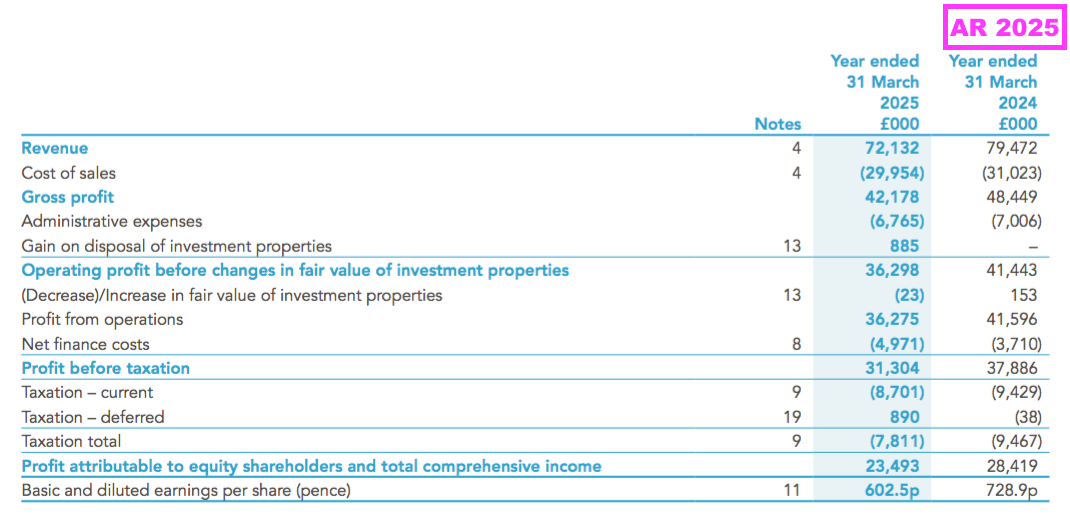
Revenue, profit, net asset value and dividend
- This FY was never likely to impress after the preceding H1 claimed “economic difficulties” contributed to a 9% lower H1 pre-tax profit:
[H1 2025] “The economic difficulties being suffered throughout the country have contributed to the Company’s gross profit for the six months ended 30 September 2024 decreasing by 4.5% and profit before tax decreasing by 9.0%“
- The sale of 11% fewer properties — 73 versus 82 — was another reason the preceding H1 reported a lower profit…
- …and the sale of 17% fewer properties for this FY — 144 versus 174 — extended the unspectacular H1 performance throughout H2.
- This FY’s revenue declined 9% to £72.1m:
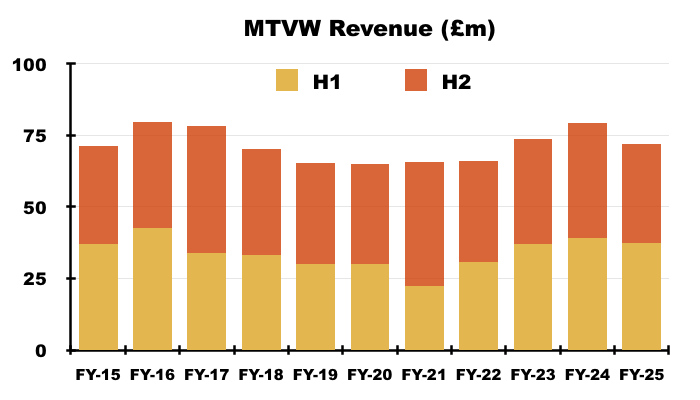
- FY operating profit in turn fell 15% to £35.4m:
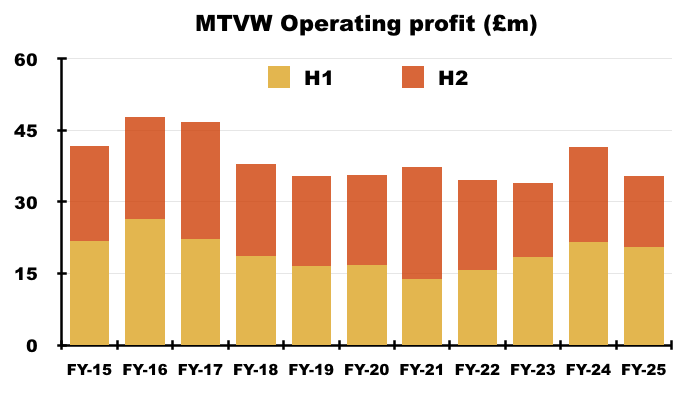
- For context, FY revenue was 10% lower and FY operating profit was 26% lower than FY 2016, during which revenue reached a record £79.8m and operating profit reached a record £47.9m.
- This FY’s performance meant H2 revenue fell 14% to £34.7m and H2 operating profit plunged 25% to £14.9m.
- FY revenue was split 69%/31% between property sales and rental income. The 69% proportion for property sales was the lowest since FY 2012 (65%):
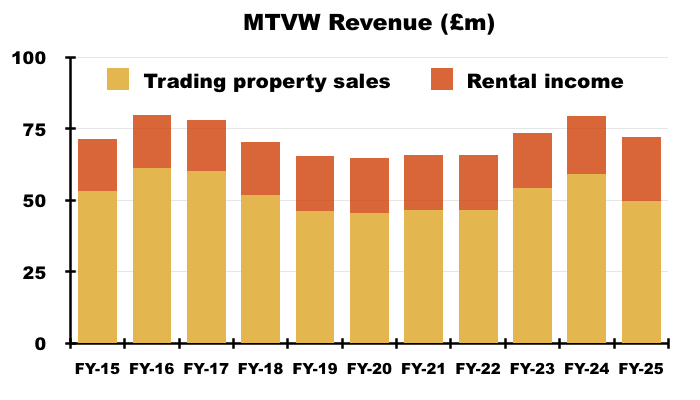
- Note that MTVW typically sells its regulated-tenancy properties after obtaining ‘vacant possession’ — which in most cases does not occur until the tenant has died:
“Regulated tenancies by their nature are not for any specific period of time and in most cases they do not become vacant until the death of the tenant. It is difficult to predict with any certainty the time at which Mountview’s inventory properties might become vacant.”
- The mix of properties becoming available for sale — and the total proceeds and profit MTVW generates — can therefore vary significantly from one set of results to the next (see Trading properties: disposals and Trading properties: property-sales gross margin).
- This FY reiterated the “uneven” nature of the group’s progress:
“Mountview’s strategy and focus on the regulated tenancy sector means that uneven movement in our annual results is an inherent feature of our business.
…
Whilst the law of averages works very well for us it does not guarantee a minimum number of vacant possessions.“
- This FY implied a mixed outlook for the UK economy, albeit with property prices predicted to move “gently upwards“:
“Looking forward, while the UK economy is projected to grow modestly in 2025,it faces significant headwinds from international trade tensions and domestic challenges. Policymakers are focusing on trade negotiations and potential monetary easing to navigate these uncertainties facing the wider economy.
In relation to property, there have been mixed drivers affecting supply and demand and thus market moves though the trends have continued to be gently upwards.”
- This FY repeated the claim that MTVW’s “lower priced” property portfolio could escape the worst of any economic ructions:
“As noted last year, we are fortunate that the properties that Mountview brings to auction are typically in high demand as they offer a lower priced entry to the housing market or, if sold to developers, provide opportunity for ‘developer profit’. We are hopeful therefore that Mountview will continue to be well placed to weather any turbulence in the general housing market, should it occur, through both continuing sales of attractive properties and also with the opportunity to purchase potentially discounted replacement properties both through auction and private tender. “
- MTVW’s properties are located mostly within London and south-east England, and 118 (82%) of the 144 properties MTVW sold during this FY achieved less than £500k (see Trading properties: disposals):
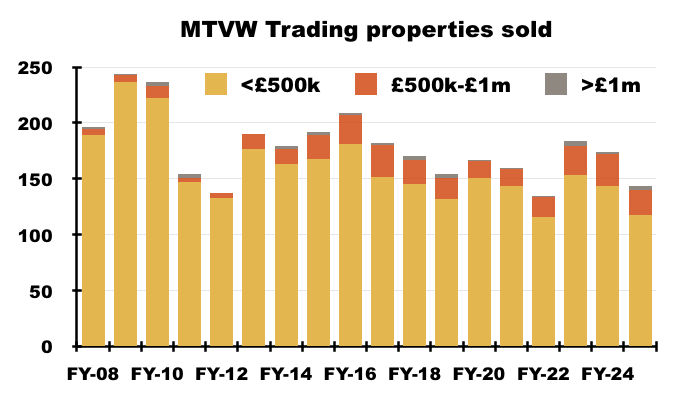
- This FY noted the significant increase to interest costs:
“Administrative expenses have been well contained but net finance costs have increased by over 33%. Thus we must report a drop in earnings per share of 17.3%.”
- FY interest payments in fact advanced 34% to £5.0m due to a higher rate of interest paid on a greater level of debt (see Financials: balance sheet).
- FY interest payments absorbed 6.9% of FY revenue, the highest FY proportion since FY 2013 (7.6%):
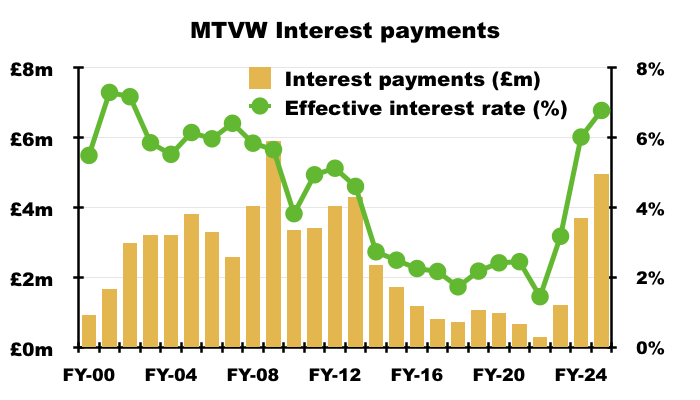
- H2 interest payments absorbed 7.4% of H2 revenue, the highest proportion for any H1 or H2 since H1 2013 (8.5%):
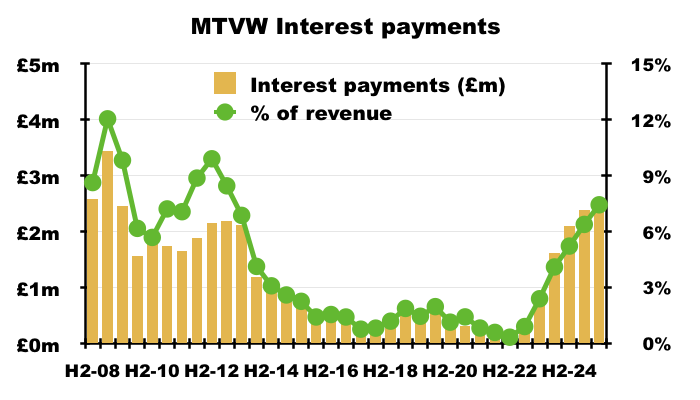
- FY earnings of £23m less the £20m dividends paid during the year meant this FY’s net asset value (NAV) increased by just £3m (+1%) to £403m or £103.27 per share:
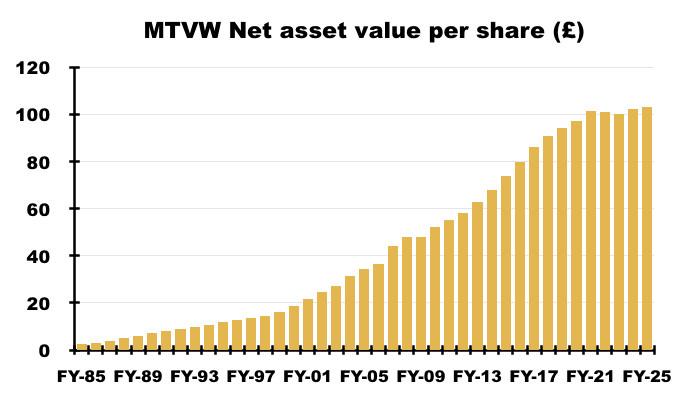
- Note that H2 earnings of £9.9m less the £9.7m H1 dividend paid during H2 meant NAV increased by only £0.2m — or 5p per share — between the preceding H1 and this FY:
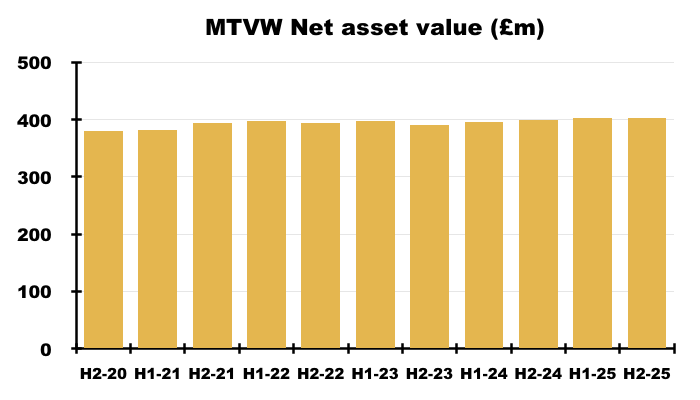
- This FY’s NAV of £403m:
- Comprised properties of £488m, debt of £80m and net other liabilities of £6m;
- Set a new record high, and;
- Exceeds the £359m market cap (see Valuation).
- NAV has settled around £100 per share during recent years, in part due to special payouts totalling 525p per share declared during FYs 2022 and 2023:
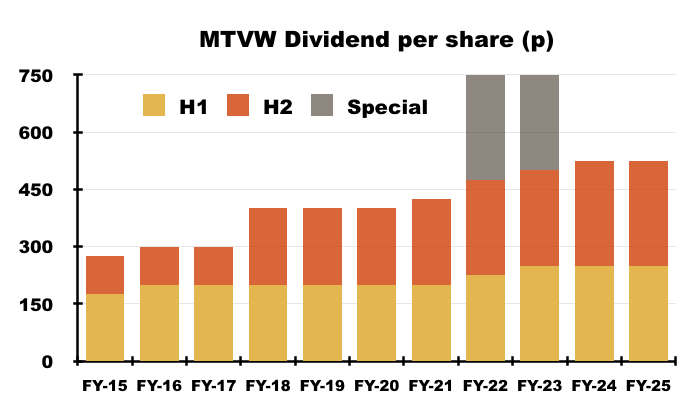
- The 525p per share paid as special dividends could have otherwise been retained to bolster NAV.
- After the preceding H1’s dividend was kept at 250p per share, this FY kept the final dividend at 275p per share.
- Companies House shows the ordinary dividend has never been cut since at least 1985 — after which the payout has risen 117-fold.
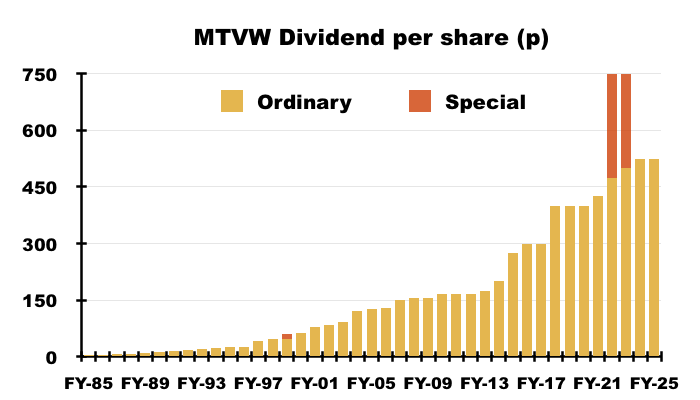
- The combination of NAV growth and the rising dividend has in the past handsomely rewarded long-term shareholders. But such returns have moderated over time.
- During the five years to this FY for example, NAV has increased by £23m and paid dividends have totalled £113m to give a combined £136m:
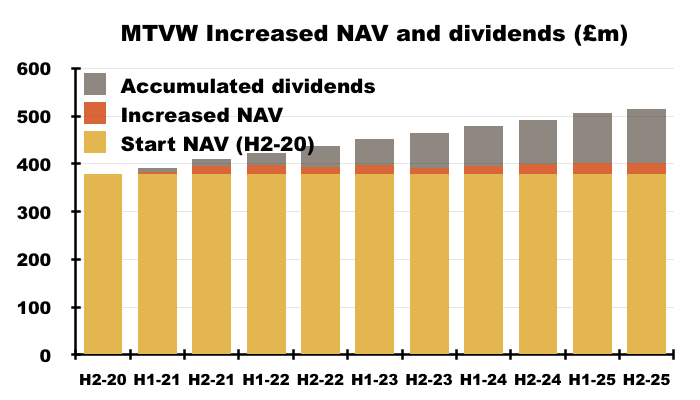
- Versus NAV of £380m five years ago, that combined £136m equates to a 36% return.
- In comparison, increased NAV and accumulated dividends came to £144m during the five years to FY 2022 (a 43% combined NAV and dividend return) — and reached £165m during the five years to FY 2019 (a 62% combined NAV and dividend return):
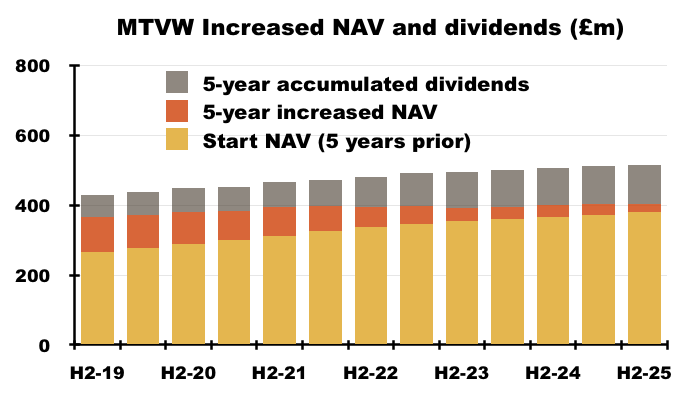
- I trust both NAV and dividend growth can soon improve as MTVW undertakes shrewd property purchases. This FY suggested such investments have been made:
“The quality and quantity of our purchases in recent years have put the Company in a good position going forwards and we continue to be offered further purchasing opportunities.”
- However, property sales achieving gross margins consistently below 60% suggests future returns could remain subdued (see Trading properties: property-sales gross margin).
Trading properties: disposals
- The 144 properties sold during this FY were split 73 during H1 and 71 during H2:
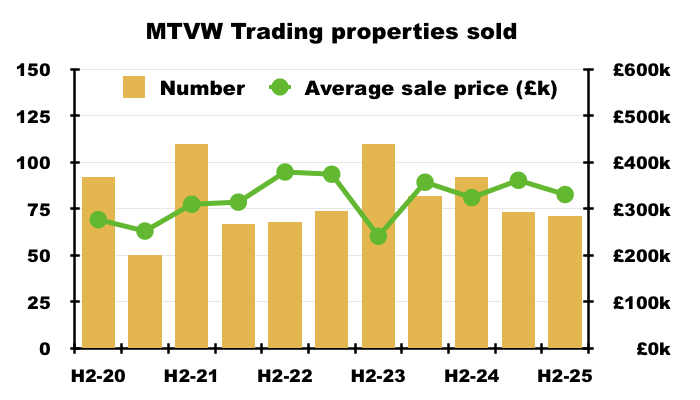
- The 144 sold properties were a notably fewer than the 173 average witnessed during the preceding ten FYs:
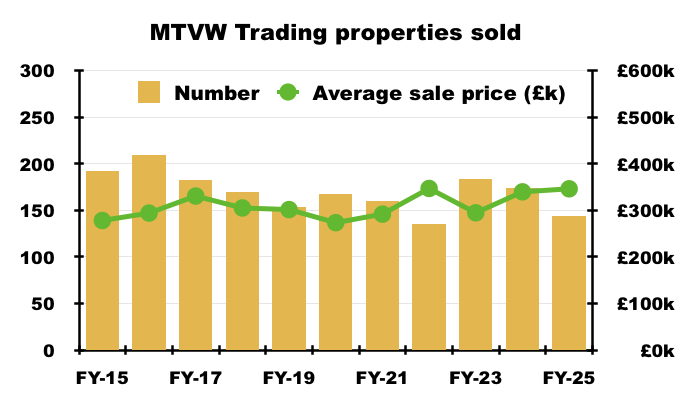
- The 144 sold properties realised aggregate proceeds of £50m or an average sale price of £346k before transaction expenses:
- This FY claimed the average sales price was £360k “excluding sales of ground rents“:
“During the financial year we achieved sales of £49.8 million (2024: £59.1 million), demonstrating the liquidity of the Portfolio. Included in the sales figure is an amount of £1 million for a group of 49 garages and ground rents that were sold as a single lot during the year. The average sales price achieved, excluding sales of ground rent, was £360k (2024: £372k).”
- Sales of ground rents have now distorted the average sales price for three consecutive FYs.
- For the comparable FY, MTVW claimed the average sales price excluding ground rents was £372k versus an average £340k for all properties.
- For FY 2023, MTVW claimed the average sales price excluding ground rents was £395k versus an average £295k for all properties.
- Board remarks at the 2025 AGM outlined how this FY’s £360k average sales price excluding ground rents was calculated. Attendees were told the average sale price was based “specifically on the number of houses, flats and dwellings” and does not include ground rents, “ancillary buildings” such as garages nor “minor” assets such as spare land.
- Attendees at the 2025 AGM were also told:
- The board was “very comfortable” with this FY’s £360k calculation, and;
- A spreadsheet compiled by the chairman and a spreadsheet compiled by the finance department “agreed on the numbers“.
- MTVW has never disclosed the numerators and denominators employed to calculate its own version of average sales prices that exclude ground rents.
- Average sale prices can also be skewed by MTVW occasionally raising £1m-plus from a single transaction. This FY included four £1m-plus disposals, while the preceding FY included two:

- This FY’s £346k average sales price was just £1k less than the record £347k average (unadjusted for ground rents!) achieved during FY 2022.
- The lower number of properties sold during this FY meant total FY proceeds from sold properties declined 16% to £50m:
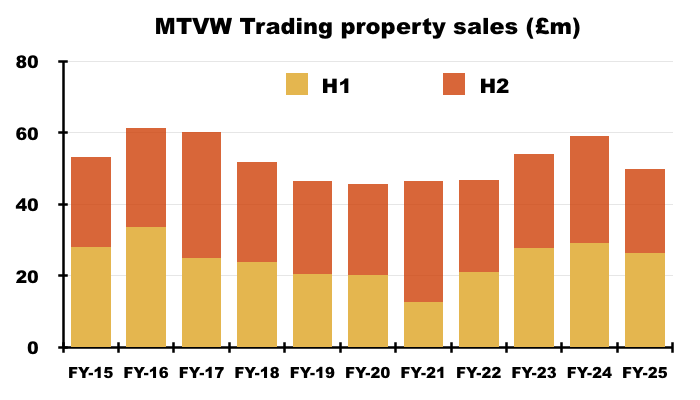
- H2 property sales fell 21% to £23m due to the number of H2 properties sold reducing by 23% from 92 to 71.
- For each FY, the mix of tenancy types sold can be deduced by comparing the amount invested in each type of tenancy and then adjusting for property purchases undertaken during that FY.
- For example, this FY reported the year-end book value of regulated tenancies, assured shorthold tenancies and ‘other’ properties had increased by £13.1m:

- This FY also reported £33.5m spent acquiring new regulated tenancies and ‘other’ tenancies (see Trading properties: acquisitions):
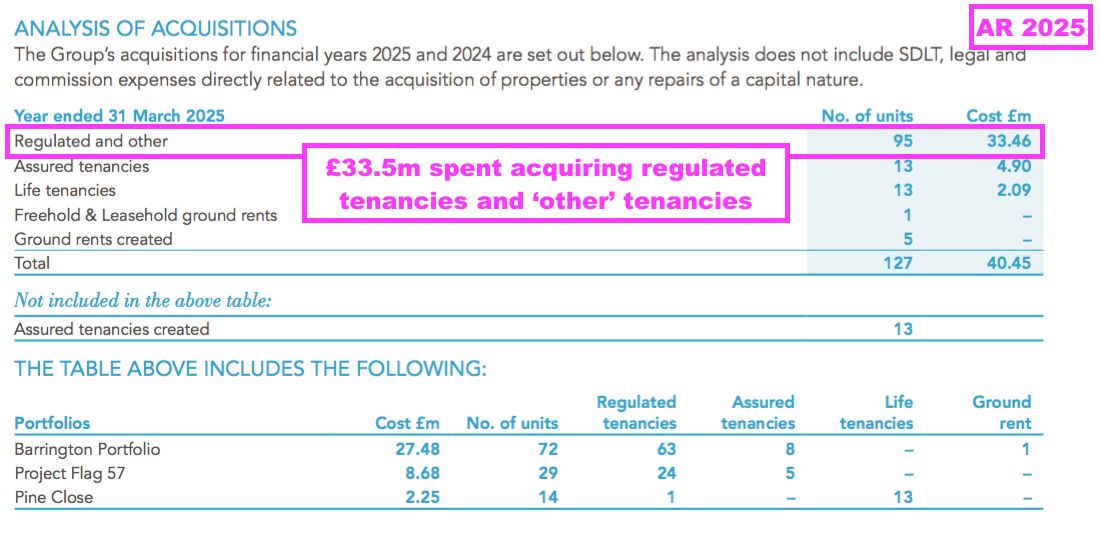
- The book value of the regulated tenancies, assured shorthold tenancies and ‘other’ properties that were sold during this FY was therefore £33.5m less £13.1m = £20.4m:
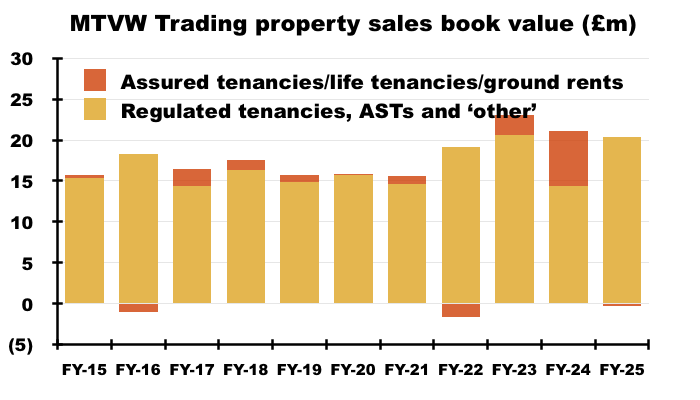
- Note that my calculations (or MTVW’s information) may not be strictly accurate, because this FY — as well as FYs 2016 and 2022 — led to a negative book value for the sold assured tenancies, life tenancies and ground rents.
- My calculations do not indicate an obvious change to the mix of tenancy types sold over time, although the comparable FY did witness the sale of assured tenancies, life tenancies and ground rents with a significant £7m book value.
- Board remarks at the 2023 AGM revealed MTVW had sold ground rents due to legislative changes (e.g. the Ground Rent Act 2022 and the Leasehold and Freehold Reform Act 2024).
- This FY disclosed ground rents representing approximately 1% of the group’s trading-property estate:
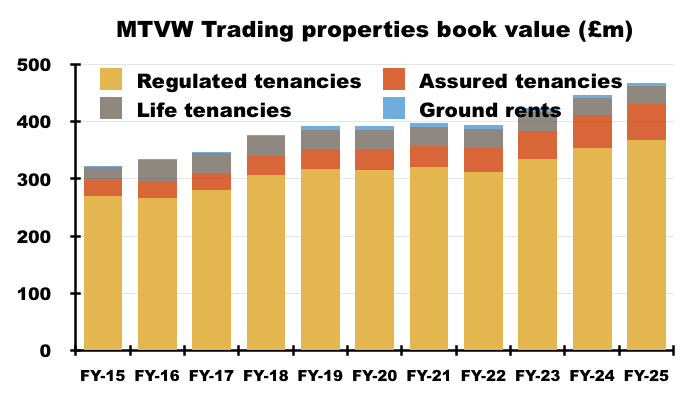
- I am also not sure the mix of tenancy types sold explains why the gross margin from property sales no longer exceeds 60% (see Trading properties: property-sales gross margin).
Trading properties: acquisitions
- This FY witnessed 122 properties acquired for £40m (before transaction expenses):
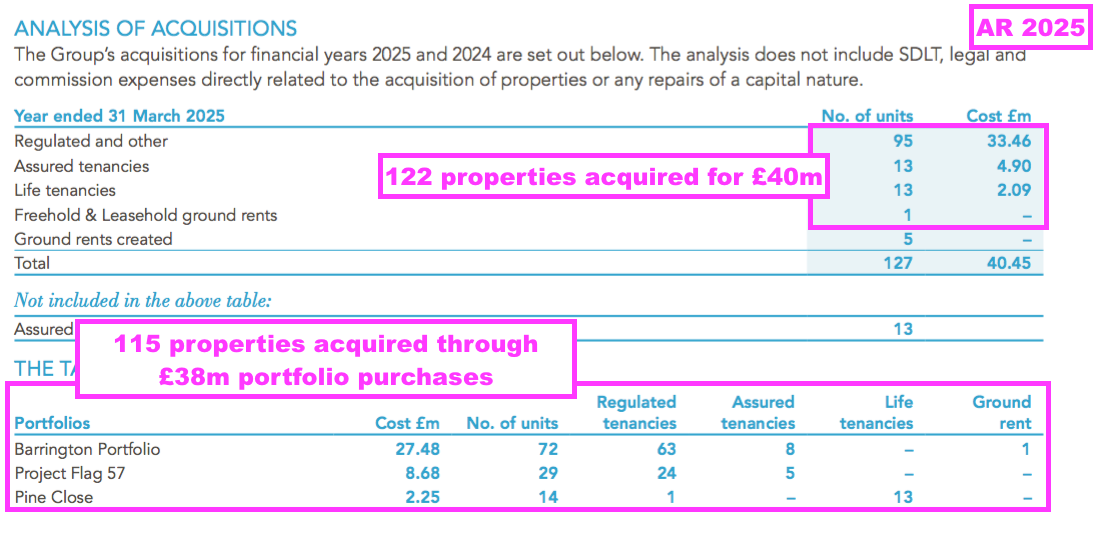
- The 122 properties acquired were split 72 during H1 and 50 during H2:
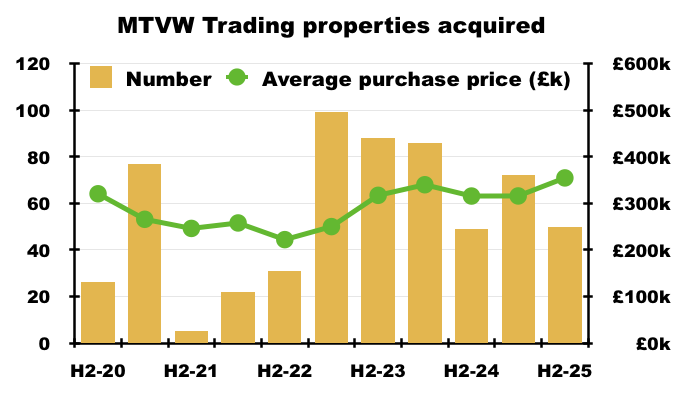
- £40m (before transaction expenses) spent during this FY versus £45m for the comparable FY and £53m for FY 2023 may suggest shrewd buying opportunities have become slightly harder to find.
- However, £40m (before transaction expenses) spent during this FY compares to an average annual £26m (before transaction expenses) spent between FYs 2013 and 2022)…
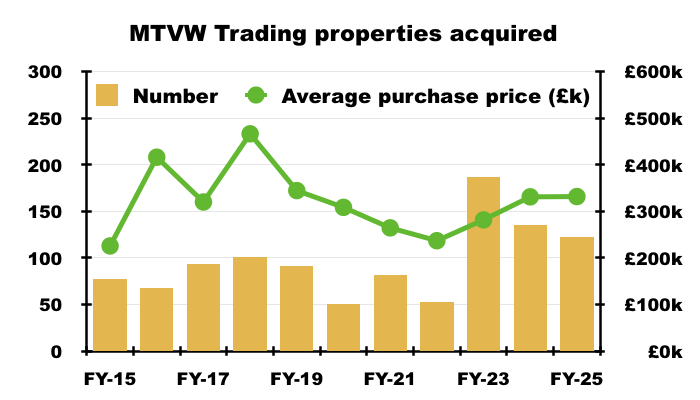
- …implying MTVW’s property expenditure remains relatively elevated.
- The average FY purchase price (before transaction expenses) was £332k and just £1k more than reported by the comparable FY.
- The average H2 purchase price (before transaction expenses) was £354k, the highest for any H1 or H2 since H2 2018 (£466k):
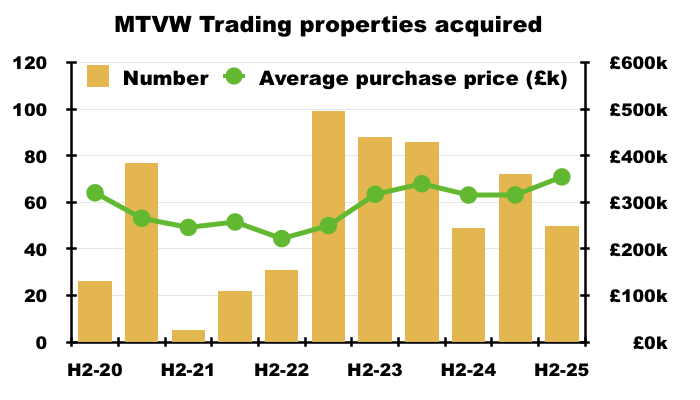
- This FY’s £332k average purchase price (before transaction expenses) was £14k less than the £346k average sale price (before transaction expenses).
- This FY was the fifth consecutive FY during which MTVW achieved an average selling price greater than its average buying price:
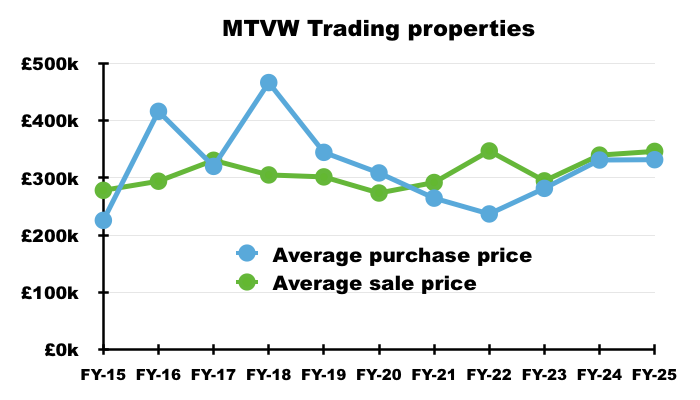
- The difference between the average selling price and the average buying price may not have any practical relevance to MTVW’s future progress. But MTVW selling at higher prices and buying at lower prices does feel more reassuring than the other way around.
- Of the £40m (before transaction expenses) spent acquiring properties during this FY, a substantial £38m (95%) was spent on portfolios of properties:
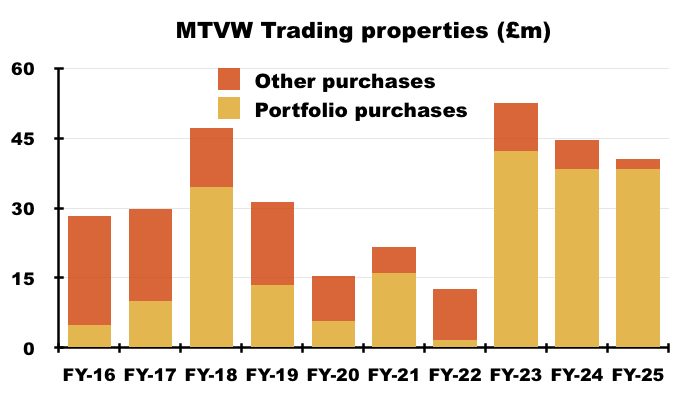
- The £38m spent on property portfolios was seemingly spread over three separate purchases, including a £27m acquisition of a 72-unit estate:
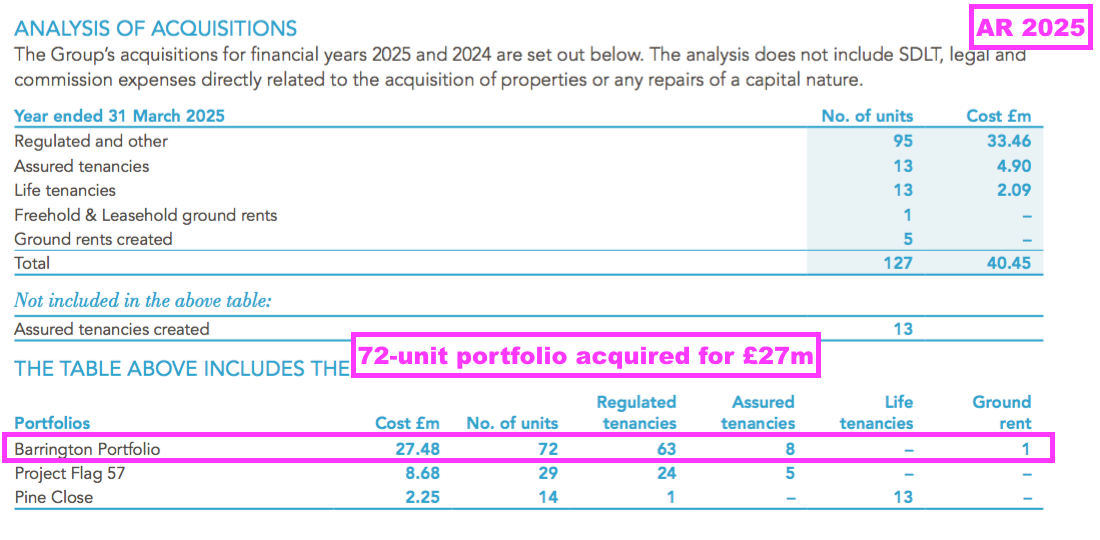
- The £27m purchase of the 72-unit portfolio appeared to contradict the £23m spent acquiring 72 properties during the preceding H1:
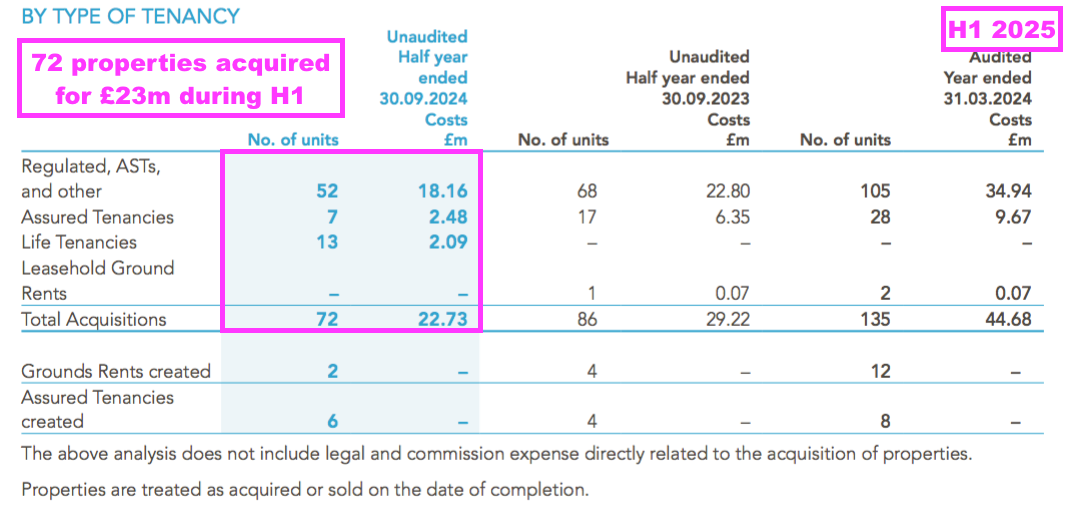
- I do not understand how a 72-unit portfolio could have been purchased in a single £27m transaction during this FY given:
- The 72 properties acquired during H1 cost only £23m versus the £27m for the 72-unit portfolio, and;
- Only 50 properties were purchased during H2.
- I can only surmise MTVW purchased smaller portfolios throughout this FY and then lumped some of them together for this FY’s reporting.
- This FY and the preceding two FYs have witnessed a combined £119m spent acquiring property portfolios, which implies the elevated buying activity of late has been prompted by larger landlords selling in bulk.
- This FY briefly acknowledged “the exodus of private landlords“:
“In the face of increasing regulatory and legislative pressures, the exodus of private landlords from the private rented sector (PRS) has continued thus squeezing supply of rental properties.”
- The comparable FY…
[FY 2024] “Operationally, we will monitor the requirements resulting from changing and evolving legislation. This will include environmental legislation and the Leasehold and Freehold Reform Act (2024) (the Act) hastily rushed through Parliament during the wash-up period prior to Parliament being dissolved on 30 May 2024.“
- …and the FY before that…
[FY 2023] “There are hypotheses circulating that the growing opportunities for purchasing have arisen due to either general concerns about the property market or more directly, concerns among buyers about acquiring properties with sitting tenants in the face of proposed reforms to the rental market. In either case both play into Mountview’s core values around careful purchasing of primarily regulated tenancies and patience in waiting for vacant possession, with the latter highly aligned with the aims behind the proposed leasehold reform. “
- …both hinted how landlords were selling due to new legislation.
- New legislation includes government proposals to raise the energy efficiency of rented properties via the Minimum Energy Efficiency Standards (MEES), which this FY hinted would create extra costs for MTVW:
“Additionally, new legislation will place further obligations on the sector. While Mountview is somewhat insulated by its regulated tenancy focus, we too must adapt—particularly in areas such as Minimum Energy Efficiency Standards (MEES).”
- Rented properties currently must possess an Energy Performance Certificate (EPC) rating of at least E, although the government is proposing rented properties must possess an EPC rating of at least C from 2028 for new tenancies and from 2030 for all tenancies.
- MTVW’s EPC information only discloses 90% of the group’s properties have an EPC rating of E or above (or are exempt), with 10% yet to receive an assessment:
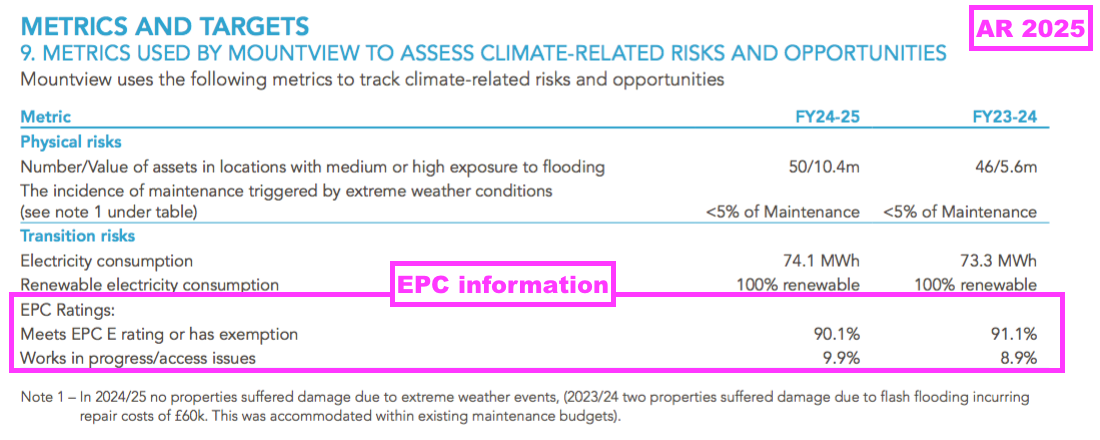
- A question about the proportion of properties that would require an EPC upgrade yielded the following unsatisfactory response during the 2023 AGM:
[AGM 2023]
“Q: Rough estimate of the number of properties affected by EPC?
MTVW: We know the current EPC ratings of our properties. Choose your own expenditure cap and multiply that by a proportion of our property portfolio. Won’t say what that proportion is. We do know the proportion, but don’t have it to hand. Would be very unfair and unreasonable to start making a guess on that question. All we have is the figure which is presented in the annual report of the number of properties that meet EPC or have an exemption.”
- I therefore speculate the proportion of properties that will require upgrading from EPC ratings D or E to C to be significant.
- The government’s MEES consultation sought views on whether “landlords should be required to invest up to a maximum of £15,000 per property on improvements to meet the standard (the ‘cost cap’), after which they could register a 10-year exemption to continue to let the property if it does not reach the standard.”
- The same proposals referred to “government modelling” and “on average, properties will require between £6,100 and £6,800 worth of investment to meet the standard under the preferred metric approach.”
- This FY showed MTVW owning 2,285 tenanted properties:

- 2,285 tenanted properties imply a possible energy-efficiency improvement bill of up to:
- £15m (approximately £3.78 a share) based on the £6.45k “government modelling” mid-point estimate, or;
- £34m (approximately £8.79 per share) based on the proposed £15k maximum.
- MTVW seems unlikely to be able pass on much (if any) of the extra EPC costs to tenants, given rents for the group’s core regulated-tenancy portfolio are set by local Valuation Offices.
- The book value of the trading properties includes “improvement costs“:
“INVENTORIES – TRADING PROPERTIES
These comprise residential properties, all of which are held for resale, and are shown in the financial statements at the lower of cost and estimated net realisable value. Cost includes legal fees and commission charges incurred during acquisition together with improvement costs. Net realisable value is the net sale proceeds which the Group expects on sale of a property in its current condition with vacant possession.“
- Expenditure to upgrade properties to EPC rating C therefore seems likely to be capitalised as stock and pass through the income statement only at the point of disposal.
- The government’s latest energy-efficiency consultation follows the initial 2020 consultation, and the general tardy progress of EPC reform to date could mean the aforementioned 2028 and 2030 timescales will be deferred.

- Up to £33.5m of this FY’s £40m property expenditure (before transaction costs) was spent acquiring MTVW’s core regulated-tenancy properties:

- MTVW has spent up to an aggregate £110m acquiring regulated tenancies during the last three FYs, which suggests the market for regulated tenancies has not disappeared just yet:
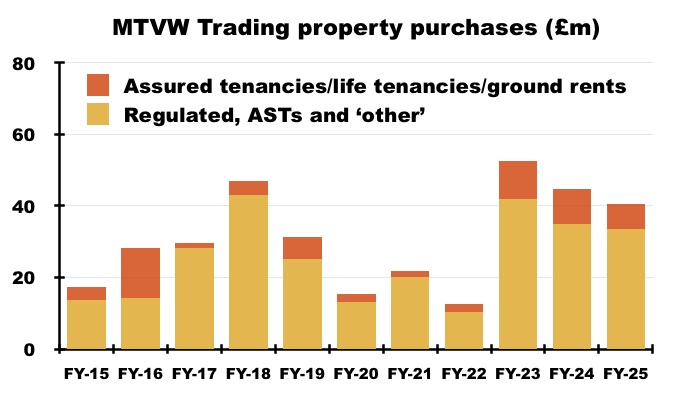
- Regulated tenancies have not been created since 1989, and the very youngest tenants of such properties will now be in their mid-50s.
- The market for regulated tenancies could therefore last another two or three decades, although transaction activity will inevitably dwindle over time.
- The number of regulated tenancies owned by MTVW surpassed 3,000 25 years ago, surpassed 2,300 ten years ago but this FY showed less than 1,800:
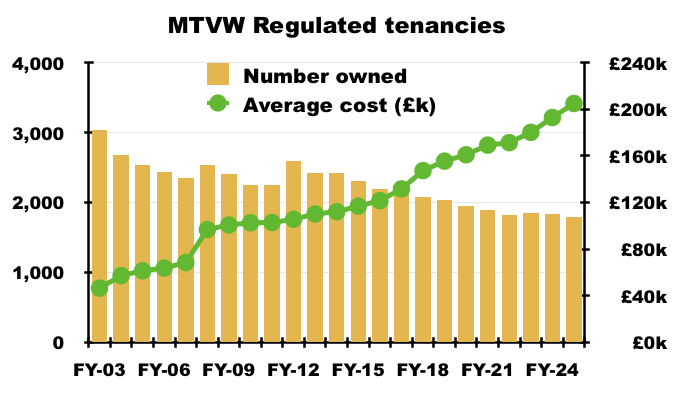
Trading properties: property-sales gross margin
- MTVW’s margin and profit can fluctuate due to the unpredictable mix of properties becoming available for sale during any particular period.
- The percentage gain on each property sold — reflected by MTVW’s gross margin — should be correlated to the duration of MTVW’s ownership, which can range from a few years to a few decades.
- This FY registered a 53% property-sales gross margin:
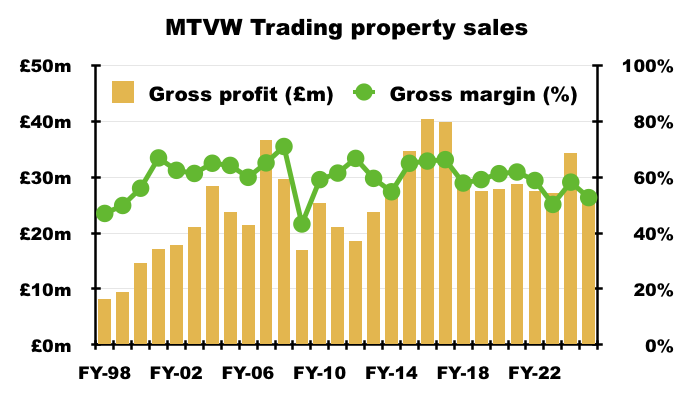
- This FY was the fourth consecutive FY with a property-sales gross margin of less than 60% — the first time such a run has occurred since the four years to FY 2000.
- Board remarks at the 2025 AGM claimed my blog had stated a run of four consecutive sub-60% property-sales gross margins had occurred during the four years to FY 2020.
- A property-sales gross margin of 53% is equivalent to buying a property for £100k and selling it for £213k.
- This FY’s property-sales gross margin was split 57% during H1 and 48% during H2:
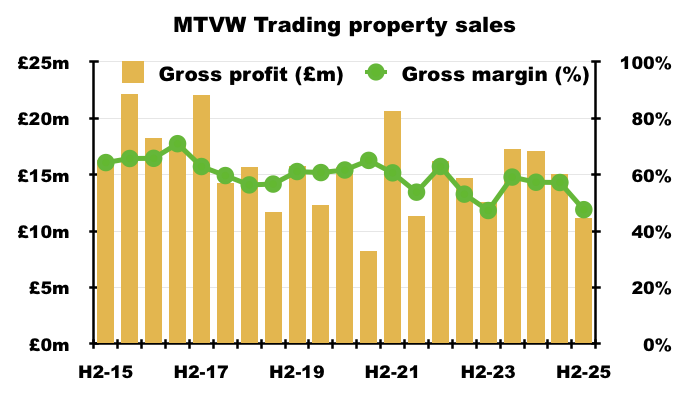
- The 48% H2 property-sales gross margin was particularly weak. Since FY 2007, only H2 2023 (47%) and FY 2009 (43%) have recorded lower property-sales gross margins.
- Bear in mind the ‘reversionary’ gains available from regulated tenancies — i.e. the value uplift that occurs when a regulated tenancy finishes, the rent reverts to a proper market level and the property can then be sold at a fair market value — will inherently reduce over time, as tenants become older and the duration to ‘vacant possession’ becomes shorter.
- The days of 60%-plus property-sales gross margins may have therefore gone for good, as the ‘reversionary gain’ potential continues to narrow for today’s regulated-tenancy buyers.
- Board remarks during the 2025 AGM did not imply a sudden return to a consistent, 60%-plus property-sales gross margin. Attendees were told:
- Sub-60% property-sales gross margins were “not a surprise“;
- “It’s a question of maths“, due to MTVW replacing properties bought at significant discounts (“historically 50%“) to estimated ‘vacant possession’ value with properties bought at narrower discounts, and;
- A “stagnant” housing market and greater “burdens” such as stamp duty have not helped profitability.
- The run of sub-60% gross margins might alternatively suggest some properties were simply acquired for too much.
- In particular, the £100m spent during FY 2008 was by far MTVW’s largest annual payment for additional properties. These purchases occurred when house prices had started to falter ahead of the banking crash:
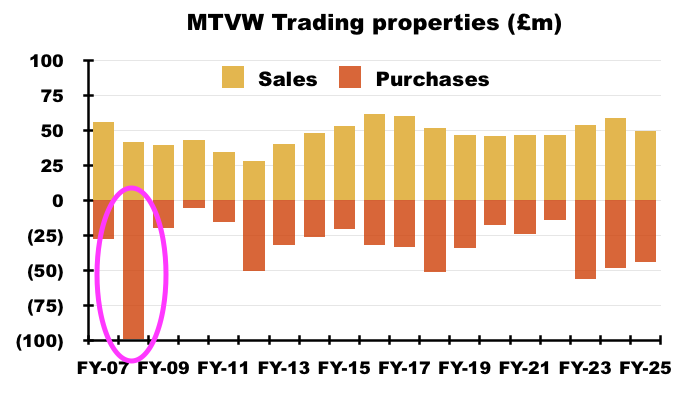
- Some £43m of that £100m was used to purchase Magdalen Park Estate in south-west London:
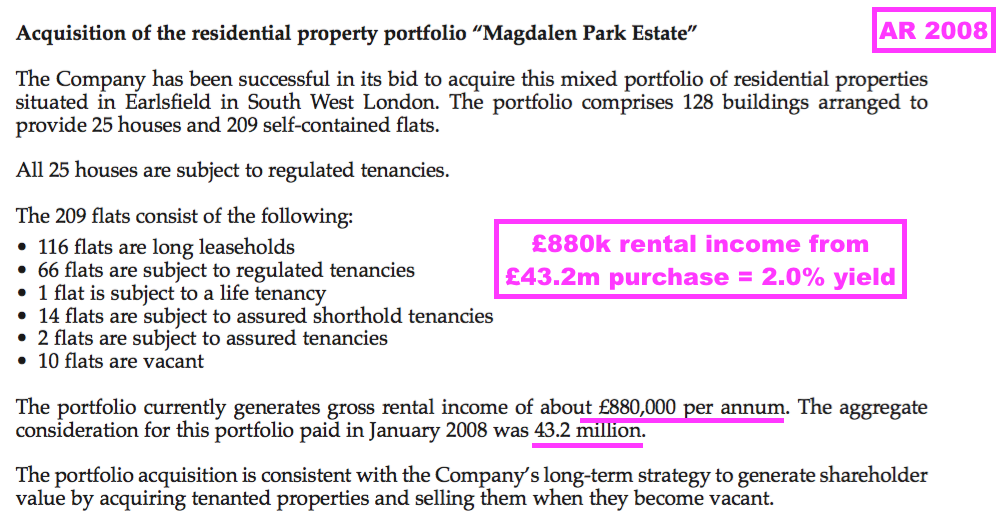
- The initial 2.0% rental yield from the Magdalen estate may not have offered tremendous value when, the year before, MTVW’s other properties were yielding a collective 5.5% rental income on their purchase cost (£12m/£218m).
EDIT 01 December 2025: Apologies! I made an error with my original text, whereby I stated the typical Magdalen property was acquired for £630k. Revisiting my 2025 AGM notes, I now realise the £630k referred to the ‘vacant possession’ value of the typical Magdalen property and the typical Magdalen property was in fact acquired for much less than £630k. As the above snippet from the 2008 annual report shows, 234 Magdalen units were acquired for £43m = £185k each.
Board remarks at the 2025 AGM claimed the returns from the Magdalen estate had been “satisfactory“.Attendees were told:The typical Magdalen property was acquired for £630k;The auditors “had their doubts” at the time about some of the properties purchased;No Magdalen property has since been sold for less than £630k, and;The typical Magdalen property now sells for “something approaching £1m” or more.
A Magdalen property increasing its value from £630k to £1m between 2008 and 2025 equates to a 17-year CAGR of 2.8%. I am therefore not entirely convinced the Magdalen estate is among MTVW’s most lucrative investments.
- Shareholder remarks at the 2024 AGM pressed the board for additional disclosure on property-sales gross margins. The directors were told:
[AGM 2024]
“Craig Murphy: My calculations and those of Maynard Paton both suggest that, since the valuation in 2014, the sales proceeds of properties bought since 2014 are about £10m short of what buying at 75% of vacant possession value would suggest. Why haven’t you commented on this? Will you publish the cost of sales split between pre-valuation and post-valuation purchases?
Maynard Paton: You should disclose more information on the margins of the properties being sold. That way we get the right calculations. Otherwise, we all draw the wrong conclusions. We’re all thinking, and the market is thinking, that the properties you’ve bought recently are just not making the gains that you suggest they can. You should disclose more information so we can get the right information and we can then draw the right conclusion.”
- This FY commendably included additional cost-of-sales information about the properties sold:

- Properties bought before the 2014 Allsop valuation and sold during this FY achieved a 63% gross margin (see Trading properties: properties valued by Allsop).
- Properties bought after the 2014 Allsop valuation and sold during this FY achieved a 25% gross margin (see Trading properties: properties not valued by Allsop).
- I must confess, I was pleasantly surprised:
- MTVW actually responded to shareholder requests to disclose additional cost-of-sales information, and;
- Properties bought after the 2014 Allsop valuation and sold during this FY achieved a 25% gross margin.
- Properties bought after the 2014 Allsop valuation achieving a 25% gross margin is important because board remarks at the 2025 AGM reiterated MTVW purchased regulated tenancies at 75% of their ‘vacant possession’ value…
- …and sure enough, purchasing regulated tenancies at 75% of vacant possession value should lead to a 25% gross margin at the point of disposal (e.g. buying a property for £150k and selling it for a £200k).
Trading properties: rental income
- MTVW’s FY rental income gained a useful 9% to set a new FY record of £22.3m:
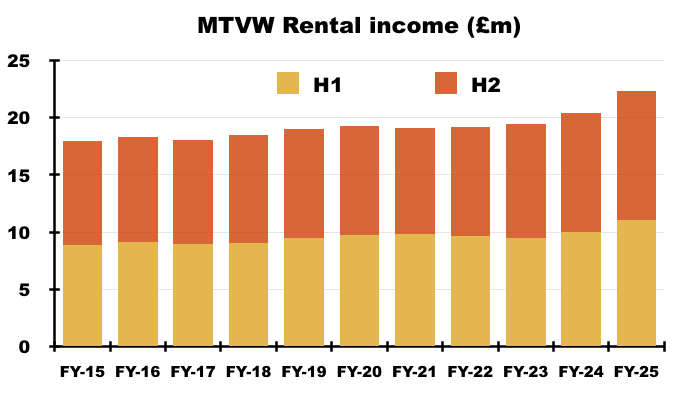
- H2 rental income gained 8% to set a new record for any H1 or H2 at £11.2m.
- MTVW has enjoyed a step-change to rental income, whereby annual rental income now exceeds £22m after having settled within the £18m-£19m range between FYs 2016 and 2023.
- The greater rental income reflects the elevated rate of recent acquisitions — and perhaps a higher rental yield on purchase.
- During the five years to this FY, annual rental income has gained 16% or £3.1m while the book value of all properties has advanced 17% or £72m:
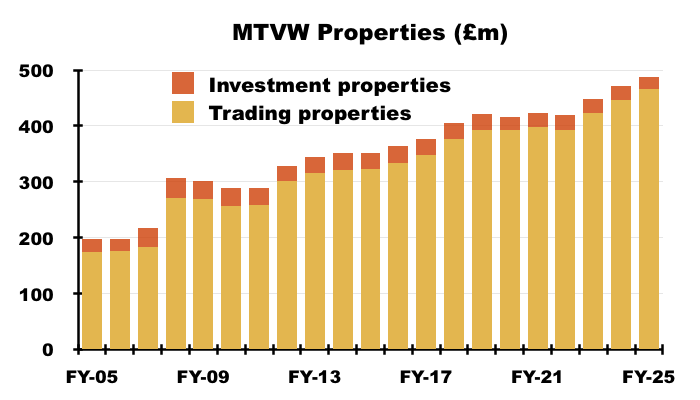
- The figures suggest for every net £1m spent on new properties during the last five FYs, an extra £43k (4.3%) has been added to the rent.
- Board remarks at the 2024 AGM implied MTVW sought to buy regulated tenancies supplying rental incomes of between 2.5% and 3% of cost.
- FY rental income of £22m equates to an effective 4.64% rental yield from this FY’s average £480m book value of all properties:
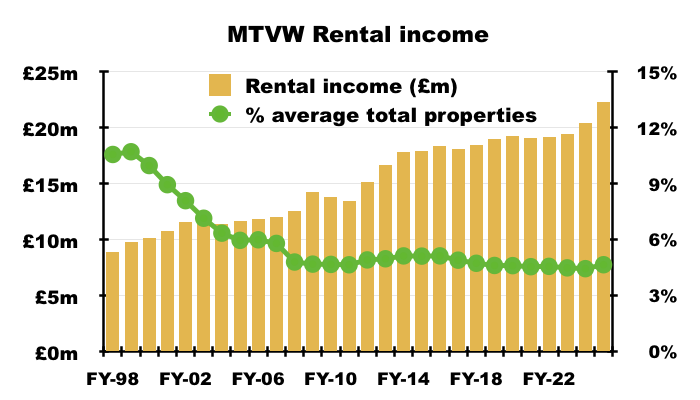
- 4.64% is the highest effective rental yield since FY 2018 (4.72%), and does support the notion that properties are being acquired with greater initial incomes that perhaps offer greater value.
- Barring the 75% spike registered during the pandemic, when certain maintenance work was deferred or cancelled, this FY’s 71% rental-income gross margin was the highest since FY 2018 (72%):
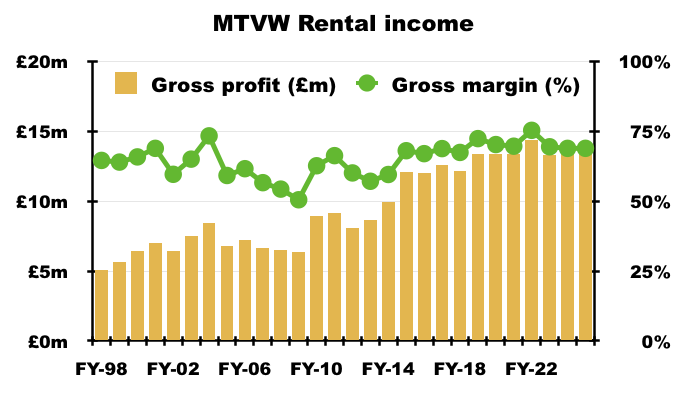
- I trust this FY’s improved rental-income gross margin also supports the notion of MTVW acquiring properties with greater initial yields that perhaps offer greater value.
- Board remarks at the 2024 AGM revealed MTVW’s rental income was used to fund property maintenance costs, administration expenses (see Financials: administration expenses and employees) and interest payments (see Financials: balance sheet), and implied such income was viewed as a ceiling to limit expenditure and borrowings.
- This FY in fact claimed rental income ought to be profitable:
“The nature of our property portfolio and prudent financial management mean that rental income alone generates a core surplus, with property sales delivering the additional margin that supports dividends and reinvestment.”
- This FY generated a rental income ‘surplus’ of £4m after rental income of £22m paid property-maintenance costs of £6m, administration expenses of £7m and bank interest of £5m:
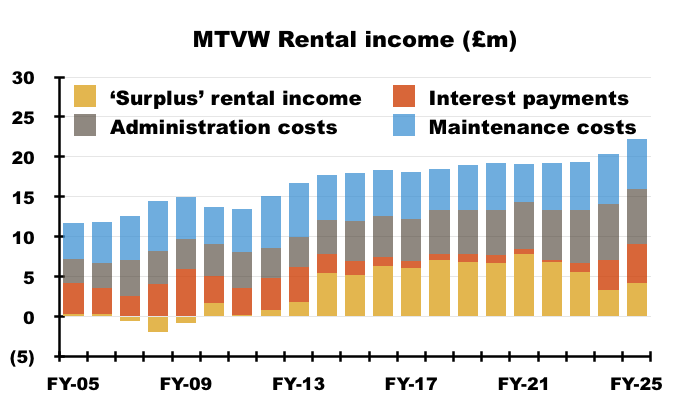
- Annual ‘surplus’ rental income has ranged between minus £2m (FY 2008) and almost £9m (FY 2021) during the last two decades.
- With rental income used to fund property-maintenance costs, administration expenses and bank interest, the proceeds from property sales are therefore left to cover tax and dividends.
- This FY generated a £22m ‘surplus’ of property-sales revenue following the £21m declared ordinary dividend and £8m taxation charge:
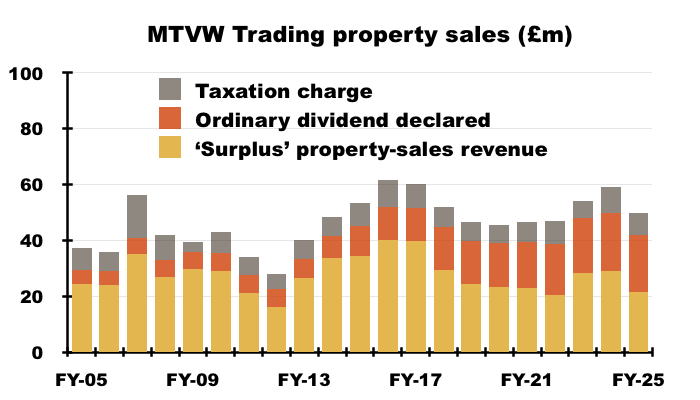
- A £22m (c550p per share) ‘surplus’ of property-sales revenue should leave useful room to fund new purchases while perhaps increasing the dividend further.
Trading properties: properties valued by Allsop
- MTVW continues to dispose of properties at a premium to a past valuation.
- To recap, MTVW commissioned property agent Allsop during September 2014 to assess the group’s estate.
- Allsop returned a £666m valuation — some 2.1x the £318m book value of the properties owned at the time.
- The Allsop assessment was based on MTVW’s properties remaining in their regulated-tenancy state and therefore excluded any ‘reversionary’ gains.
- The Allsop assessment was never applied to the formal accounts. MTVW’s trading properties instead remain on the balance sheet at their cost price.
- Following the Allsop assessment, MTVW reveals the proceeds from sold properties versus their Allsop valuation:

- This FY witnessed MTVW sell properties with a combined £25.2m Allsop valuation for £36.3m — a premium of 44%:
- This FY’s 44% premium was split 42% during H1 and 47% during H2:
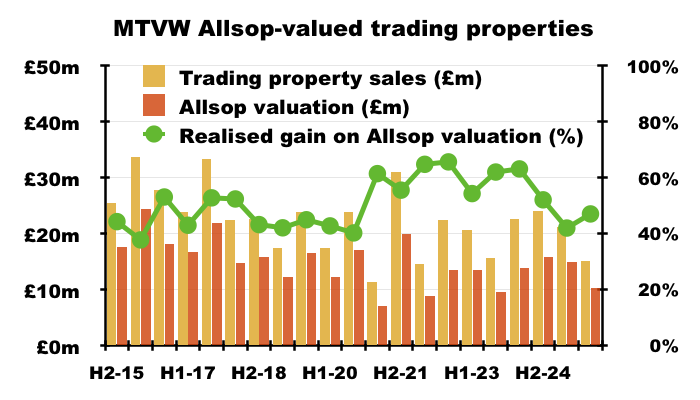
- During the 10.5 years following the Allsop assessment, MTVW has raised £470m from selling properties the agent had valued at £314m.
- Selling properties that Allsop had valued at £314m implies their book value (i.e. the original cost) was £150m (i.e. £314m divided by the aforementioned 2.1x multiple).
- Selling Allsop-valued properties with a £150m book value indicates Allsop-valued properties with a £168m book value remain within MTVW’s ownership (i.e. the £318m book value at the September 2014 assessment less the £150m since sold).
- This FY showed total trading properties possessing a £467m book value, implying properties purchased after the Allsop review and still retained by MTVW have a £299m book value (i.e. £467m less the remaining Allsop-valued properties of £168m).
- The aforementioned disclosure of additional cost-of-sales information provides alternative figures to those £150m, £168m and £299m calculations.
- For this FY at least, properties valued by Allsop achieved a 2.69x sale multiple (£36.3m/£13.5m) to their book value:

- Using this FY’s new 2.69x sale multiple, selling properties for £470m during the last 10.5 years that Allsop had valued at £314m now implies their book value could have been £175m (i.e. £470m divided by the 2.69x sale multiple).
- And selling Allsop-valued properties with a £175m book value now indicates Allsop-valued properties with a £143m book value could remain within MTVW’s ownership (i.e. the £318m book value at the September 2014 assessment less the £175m since sold).
- And with this FY showing total trading properties with a £467m book value, properties purchased after the Allsop review and still retained by MTVW may now have a £324m book value (i.e. £467m less the remaining Allsop-valued properties of £143m).
- I must confess I am not quite sure whether my valuation sums should apply my £150m, £168m and £299m calculations or my alternative £175m, £143m and £324m calculations.
- In theory at least, my £150m, £168m and £299m calculations ought to prove more reliable over time because they are based upon Allsop-valued properties averaging that 2.1x multiple over book.
- In contrast, my alternative £175m, £143m and £324m calculations are based upon this FY’s 2.69x sale multiple — and that 2.69x multiple could have been very different in previous FYs and may be very different in future FYs.
- At least the different numbers lead to similar estimates for MTVW’s potential share price (see Valuation).
- As more Allsop-valued properties are sold and other properties are purchased, the less relevant the 2014 Allsop valuation becomes to MTVW’s share price.
- According to my sums, MTVW may take between eight and twelve years to sell the rest of the Allsop-valued properties.
- MTVW’s results commentary has never referred to the Allsop valuation since the assessment was undertaken. This FY repeated the explanation why:
“[The Allsop] valuation is not a useful tool for running the business because we are always going to await vacant possession, and no perceived uplift in value can justify selling a tenanted property. The nature of our business and the rules and conventions under which we operate place no obligation upon us to value our trading stock at any given time and therefore the valuation has not been updated since.”
- Numerous shareholders have questioned the board during several AGMs about the prospect of another Allsop-type valuation. However, the board has repeatedly rejected another assessment. Reasons given have included:
- The assessment is not used by management;
- The assessment is expensive, and;
- There is no accounting requirement.
- Note that the 2014 Allsop valuation — and the revelation that the property estate could be worth 2.1x its then book value — prompted the share price to rally to £125:
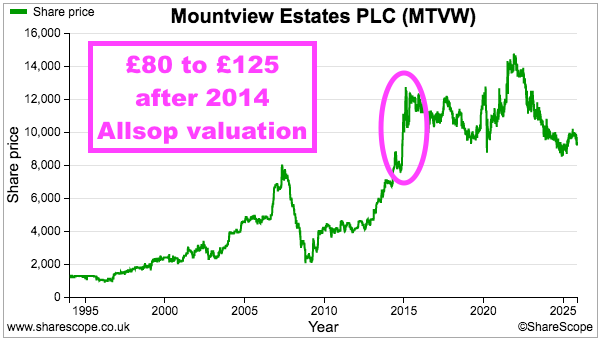
- I maintain MTVW should implement regular Allsop-type valuations to provide greater clarity about the inherent value of the group’s property estate.
- In particular, further valuations would help shareholders judge the astuteness of MTVW’s recent purchases and perhaps allay worries about the ongoing modest NAV growth.
- Board remarks at the 2021 AGM revealed the Allsop valuation cost £600k and “would be more now“.
- Even if another Allsop assessment cost £1m, the shareholder value created through an increased market-cap could make the process extremely worthwhile. The shares adding, say, £20, following a favourable valuation would create additional market value of £78m.
- The board may argue MTVW’s illustrious NAV and dividend records have served outside shareholders very well despite the lack of formal valuations.
Trading properties: properties not valued by Allsop
- The Allsop assessment and associated disclosures allow shareholders to evaluate the properties not valued by Allsop.
- During this FY, properties bought after the Allsop valuation raised proceeds of £13.5m:

- This FY’s additional cost-of-sales disclosure revealed the original cost of those properties to be £10.1m.
- Raising £13.5m from selling properties with a £10.1m purchase price indicates MTVW disposed of the properties at a 34% premium.
- This 34% gain correlates to board remarks at the 2025 AGMs, which reiterated MTVW purchased regulated tenancies at 75% of their ‘vacant possession’ value.
- A regulated property purchased at 75% of ‘vacant possession’ value should (in theory!) enjoy a 33% ‘reversionary’ gain when the property eventually becomes vacant.
- Prior to this FY’s additional cost-of-sales information, I had to estimate the cost of the properties bought after the Allsop valuation and then sold during a particular FY.
- Without this FY’s additional cost-of-sales information, I would have calculated:
- The £25.2m Allsop-valued properties sold during this FY possessed a book value of £12.0m based on the aforementioned 2.1x multiple, and;
- Properties bought after the Allsop valuation and sold during this FY therefore possessed a book value of £11.5m and generated a 17% premium on disposal.
- I must confess I am once again not sure how my valuation sums should apply the additional cost-of-sales information.
- In particular, the 34% premium realised from properties bought after the Allsop valuation and sold during this FY relates only to this FY…
- …and that 34% premium could have been very different in previous FYs and may be very different during future FYs.
- In contrast, applying my previous approach that derived the estimated 17% premium should prove more reliable over time, because it is based upon the Allsop-valued properties averaging that aforementioned 2.1x multiple over book.
- Employing my previous approach, I calculate:
- During the 10.5 years following the Allsop valuation, MTVW has raised a total £77m from selling properties not valued by Allsop with an estimated book value (i.e. purchase price) of £71m, and;
- During the five years to this FY, MTVW has raised a total £58m from selling properties not valued by Allsop with an estimated book value of £52m:
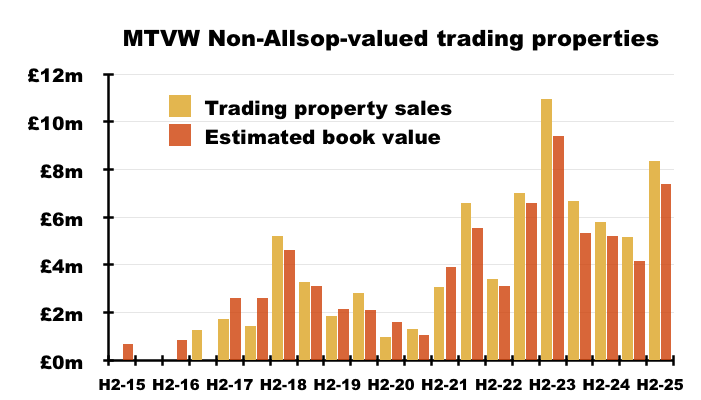
- My estimates could easily explain why the property-sales gross margin has been less than 60% during recent years; properties bought and then sold since September 2014 may well have realised only modest gains.
- Mind you, the premiums realised on properties bought after the Allsop assessment have been increasing. The aggregate gain for the:
- Past 10.5 years is 8%;
- Past five FYs is 13% and;
- Past three FYs is 15%.
- And of course, not every property MTVW has purchased following the Allsop assessment has been sold.
- Those properties not valued by Allsop but still owned by MTVW could be sitting on huge paper gains, while those that have been sold were held for relatively short durations that might have limited their final profit.
- Furthermore, MTVW acquires properties other than regulated tenancies, which may require more than the 10.5 years since the Allsop assessment to maximise their upside.
- Still, buying properties for an estimated £71m/£52m and then selling for £77m/£58m can’t be deemed a rousing success — assuming my estimates are accurate of course.
- Note that transaction costs (as well as improvement costs) are included within the book value of the trading properties:
“INVENTORIES – TRADING PROPERTIES
These comprise residential properties, all of which are held for resale, and are shown in the financial statements at the lower of cost and estimated net realisable value. Cost includes legal fees and commission charges incurred during acquisition together with improvement costs. Net realisable value is the net sale proceeds which the Group expects on sale of a property in its current condition with vacant possession.“
- I am not convinced greater transaction and improvement costs have moderated MTVW’s property gains over time. My estimates do not show an obvious uplift to such expenses:
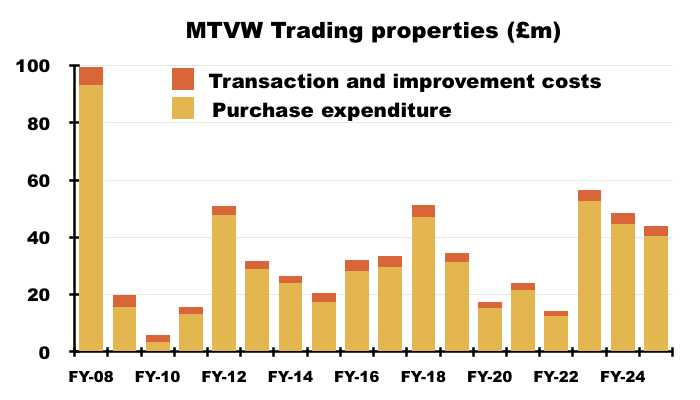
- I estimate this FY’s transaction and improvement costs were £4m to give total FY property expenditure of £44m.
- The absence of a follow-up Allsop-type assessment — alongside my aforementioned estimates — leaves me to assume the properties not valued by Allsop but still carried on the balance sheet might enjoy a 13%-15% gain on their disposal.
Financials: balance sheet
- MTVW’s accounts remain very straightforward, with properties and debt the two prime entries:
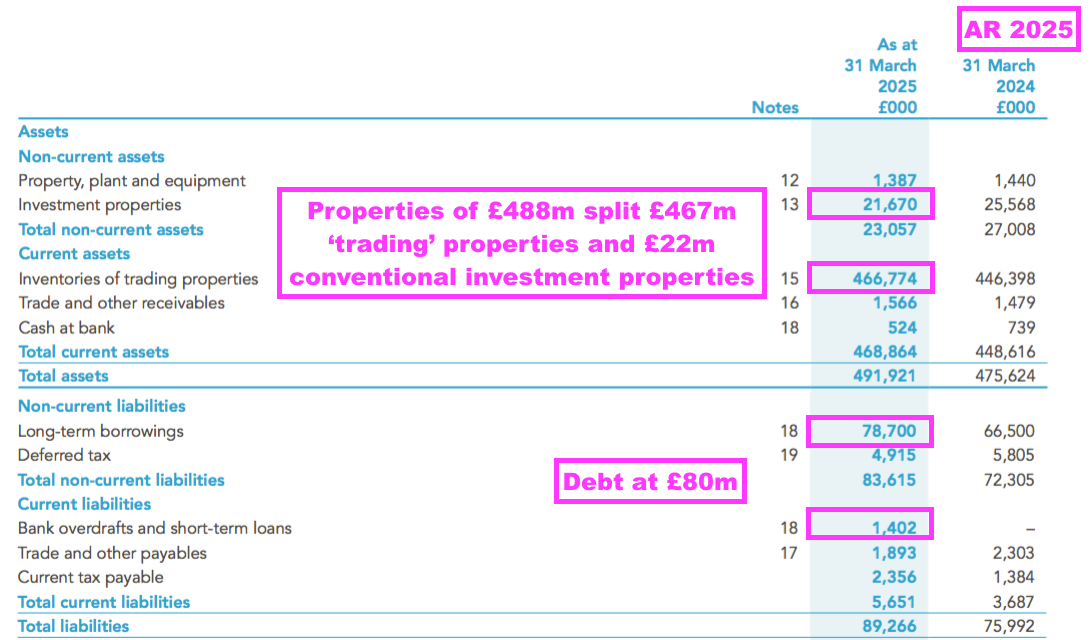
- The aforementioned £44m spent on new properties (including transaction and improvement costs) left free cash flow at £2m. Dividends costing £20m offset by investment-property disposals of £6m then increased FY debt from £67m to £80m.
- Debt at £80m is the highest since H1 2014 (£99m), but is equivalent to only 16% of the group’s £488m total property estate:
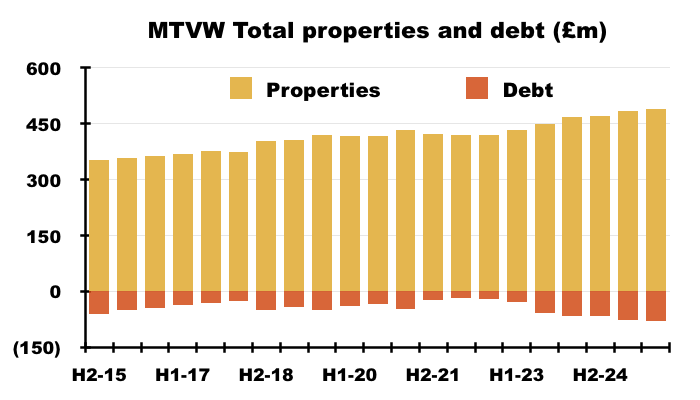
- For perspective, MTVW operated with debt equivalent to 25% or more of its property estate during FYs 2008, 2009, 2010, 2012 and 2013:
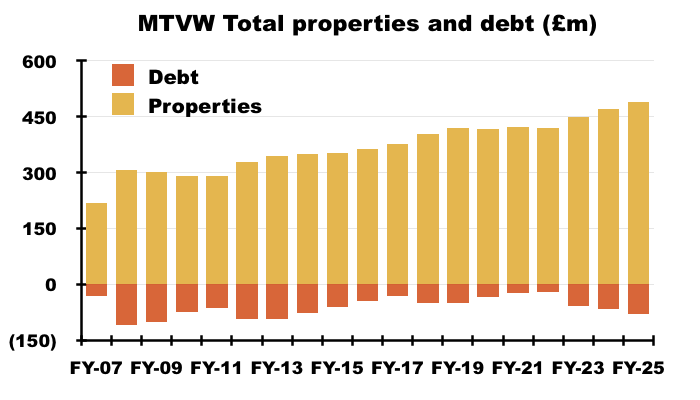
- MTVW’s banking facilities allow borrowings of up to £90m, equivalent to 19% of the total property estate:
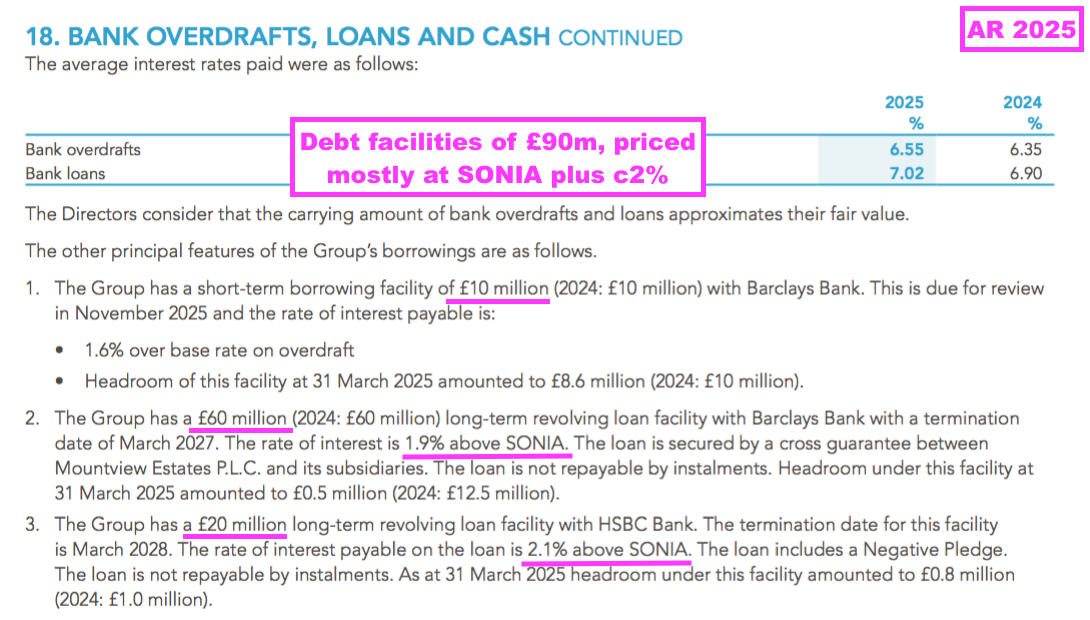
- A repeat of this FY’s £13m debt increase during FY 2026 would take debt to £93m and require MTVW to extend its £90m borrowing facilities.
- Finance costs of £5.0m for this FY were 34% greater than the £3.7m for the comparable FY, and implied a 6.78% interest rate on this FY’s £73m average debt:
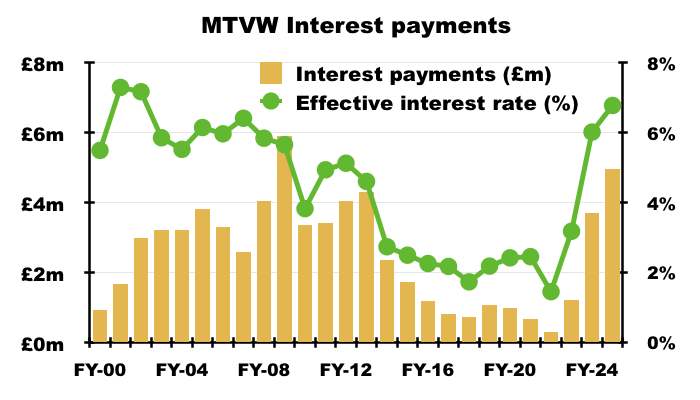
- H2 finance costs increased 23% to £2.6m and implied a 6.56% interest rate on this H2’s £79m average debt:
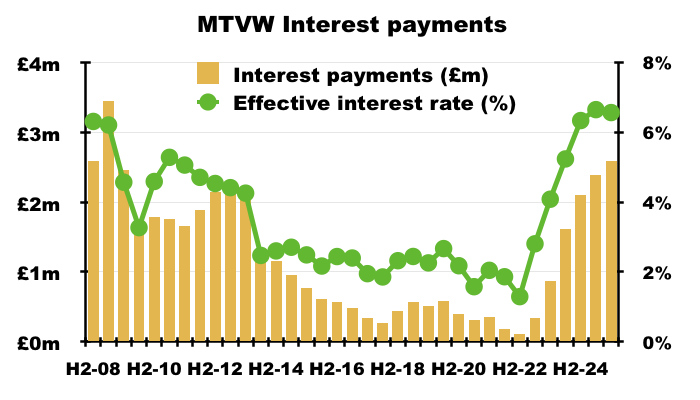
- My estimated FY interest cost of 6.78% is the highest since FY 2002 (7.17%).
- This FY reconfirmed MTVW’s borrowings incur an approximate 2% margin above SONIA.
- SONIA is currently 3.97%, which means MTVW should now be paying approximately 6% on its debt.
- Assuming debt stays at £80m and SONIA stays at 3.97%, FY 2026 finance costs would be £0.2m lower than this FY’s £5.0m.
- While lower interest costs are welcome, what really counts of course is whether the properties purchased by any extra borrowings generate eventual returns well in excess of the projected 6% interest expense!
- The aforementioned £4m rental-income surplus after all maintenance, administration and finance costs could (in theory!) allow MTVW to borrow a further £70m at 6%, which would take debt to £150m and gearing to 31%.
Financials: administration expenses and employees
- This FY’s administration expenses declined 3% to £6.8m:
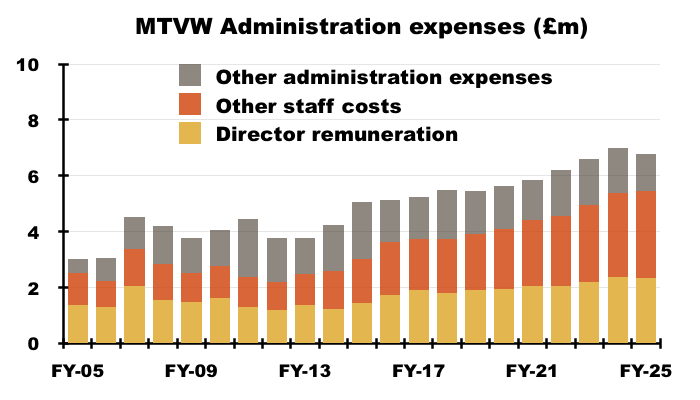
- Employee costs represent the majority of administration expenses. During this FY, administration expenses comprised employee costs of £5.44m (up 1%) and other costs of £1.32m (down 13%).
- Administration expenses excluding employee costs at £1.32m were the lowest since FY 2013 (£1.28m):
- A significant proportion of employee costs are payments to the directors. During this FY, employee costs consisted of £2.4m paid to the directors (see Boardroom: new non-executive and executive pay) and £3.1m covering the salaries of other employees plus the group’s social security and pension obligation:
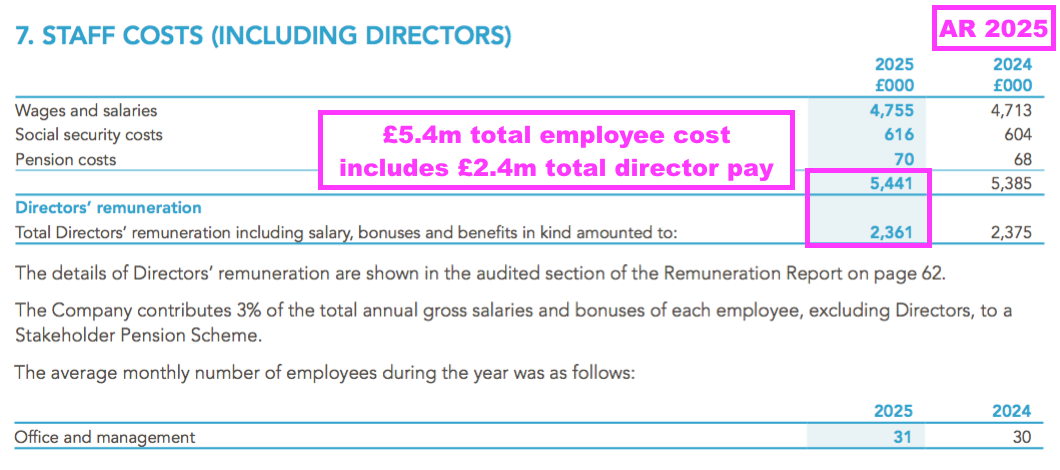
- The cost of employing the wider (non-director) workforce has advanced 43% since FY 2020 (£2.2m) and has more than tripled since FY 2012 (£1.0m).
- I estimate this FY’s average salary among the wider workforce was £82.6k, up 38% since FY 2020 (£60.0k) and up 86% since FY 2015 (£44.4k).
- This FY stated the average employee wage (excluding directors) had in fact advanced 50% during the last five FYs:
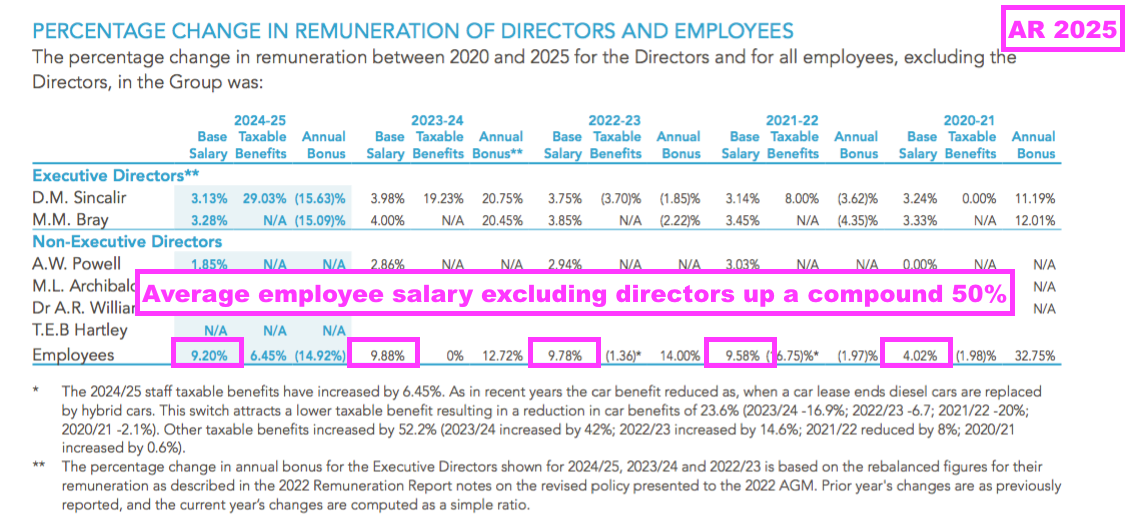
- Administration expenses absorbed 30% of rental income during this FY, a welcome reduction from the 34% recorded during the comparable FY:
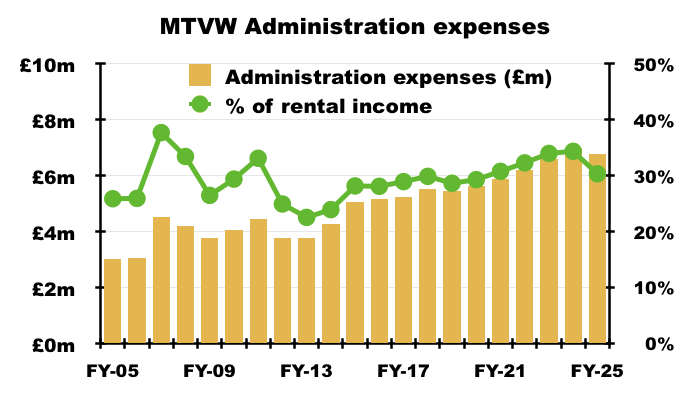
- Annual administration expenses versus the value of total properties have remained very consistent at approximately 1.5%:
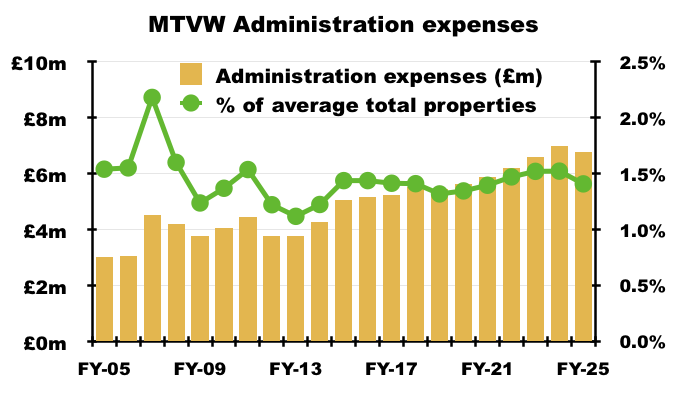
- Higher salaries for employees — and directors! — may therefore not be entirely out of step with the group’s progress.
- MTVW’s chunky director pay may be a by-product of not operating an option scheme (see Boardroom: new non-executive and executive pay), not contributing to executive pensions and keeping other expenditure to a bare minimum.
- Nothing is certainly spent on investor communications beyond the annual report, the website, the occasional terse RNS and hosting mandatory shareholder meetings.
Boardroom: protest votes
- MTVW’s shareholders fall into three camps:
- The Sinclair family concert party, which is led by MTVW chief executive Duncan Sinclair and at the last published count controlled 50.4% of the shares (see Sinclair family concert party);
- The Murphy family and connected parties, who claim to own 24% of the shares and whose leading shareholder is Margaret Murphy, the chief executive’s sister, and;
- Everybody else, who own approximately 25% of the shares.
- MTVW’s last nine AGMs have witnessed c30% protest votes against:
- Re-electing certain non-execs and, recently, both the executives;
- Approving the board’s pay, and;
- Re-appointing the auditors.
- The protest votes have been led by the Murphy family and connected parties.
- I understand the Murphy family:
- Has lost the trust of the non-execs to act on the views of all shareholders, and;
- Is frustrated about a general lack of influence at board level, especially when non-execs were appointed to the board after the board apparently claimed no further non-execs were required.
- Particular grievances held by the Murphy family include MTVW’s:
- Interpretation of the corporate-governance code concerning ‘independent’ non-execs;
- Executive and employee pay;
- Lack of transparency over the size of the concert party’s combined holding;
- Borrowing limits as set by the group’s articles of association (a disagreement apparently dating back to 1991), and;
- Seemingly modest gains realised on properties purchased after the Allsop valuation.
- The Murphy family stated during the 2021 AGM that it was no longer in direct communication with the board and would engage with the directors only through a “public forum“. I understand that policy remains in place.
- Among the attendees at the 2023 AGM was David Pears, who is a member of the Pears family that owns property group William Pears and controls a 7% MTVW stake through the family’s Talisman investment fund:
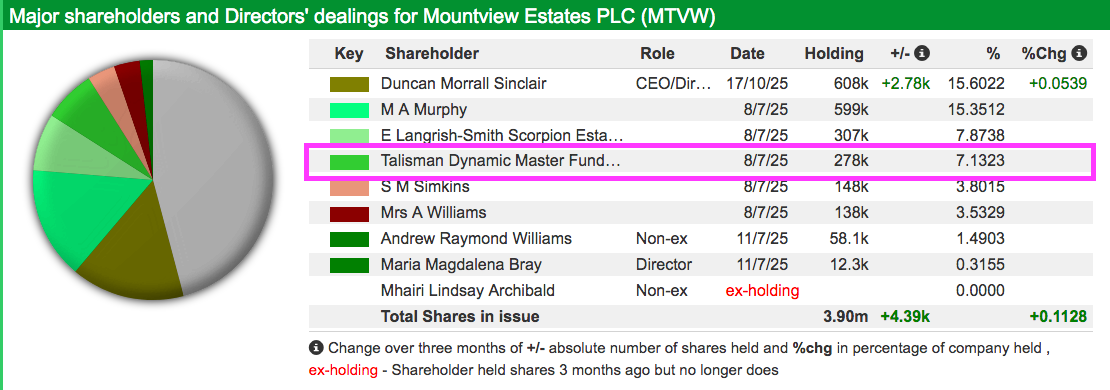
- Mr Pears is not a happy shareholder, at least judging by his 2023 AGM questions.
- The Murphy family, Talisman and other unhappy shareholders prevented the re-election of the ‘independent’ non-execs at the 2025 AGM — and the eight prior AGMs:
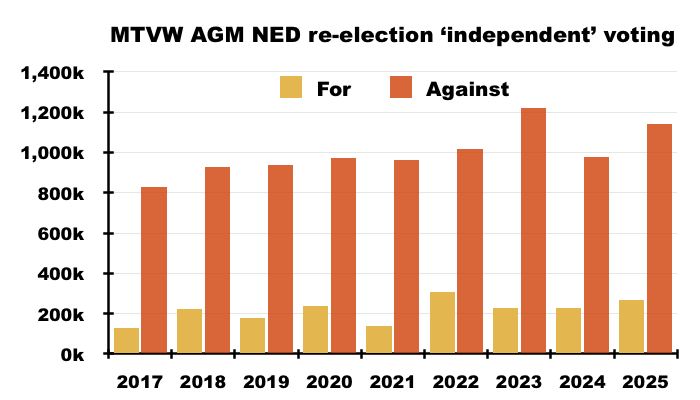
- The sole non-exec not voted off the board at every AGM is Dr Andrew Williams, who is a grandson of MTVW co-founder Frank Sinclair.
- Dr Williams is a member of the Sinclair family concert party (but is not listed as such — see Sinclair family concert party) and apparently “represents the interests of the family and private shareholders generally“:
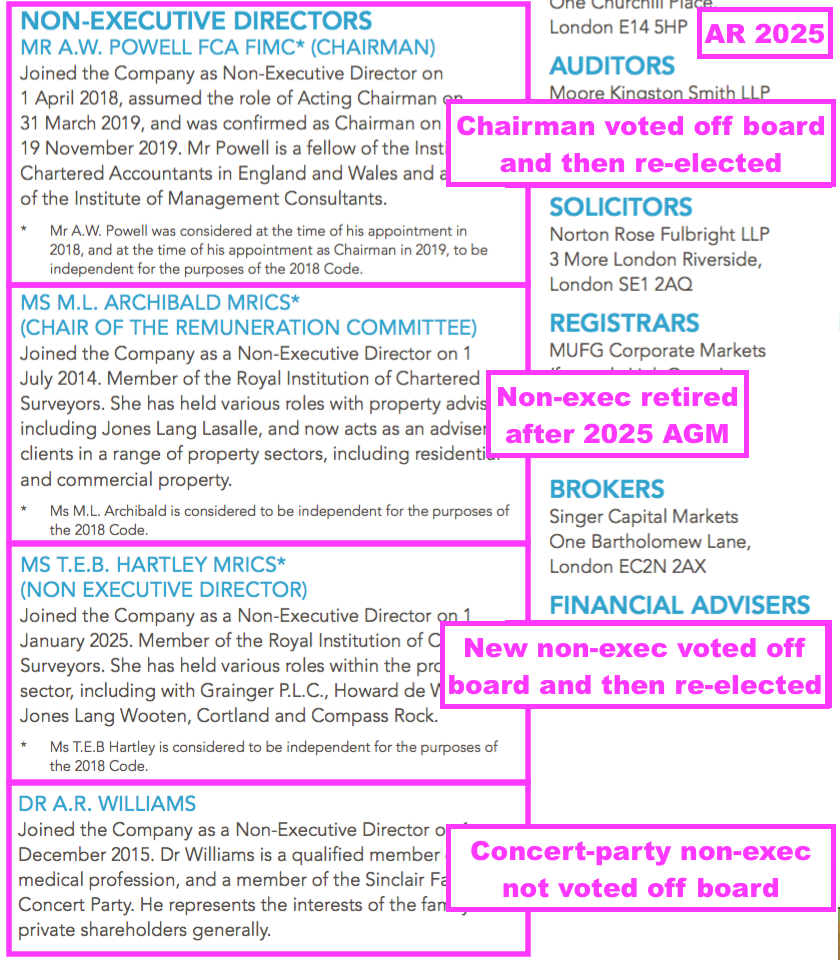
- I attended MTVW’s 2019, 2021, 2023, 2024 and 2025 AGMs and Dr Williams did not speak during the formal Q&A sessions at all five events.
- The Murphy family (and connected parties) and Talisman have clearly become fed-up with the executives, too, given the votes against the executives have increased from immaterial numbers to 3%, then 9%, then 32% and now 36% during the last four AGMs:
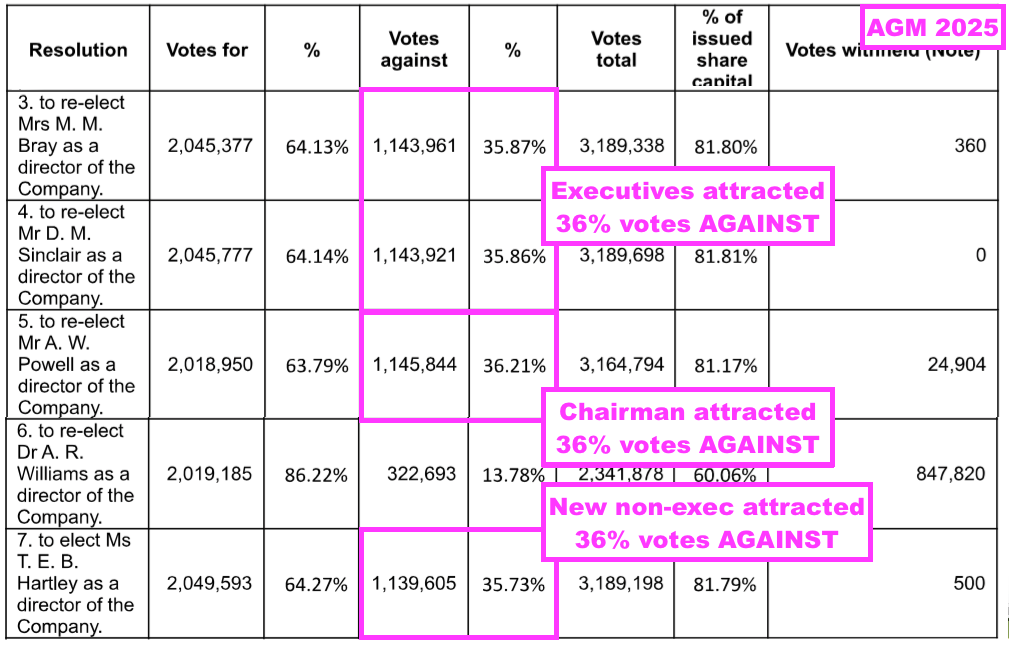
- Following each AGM, MTVW is entitled to convene a general meeting (GM) and hold a further vote to re-elect the ousted non-execs.
- The ousted non-execs have (to date) all been re-appointed at the subsequent GMs because the Sinclair family concert party can then vote on the non-exec re-elections (unlike at the AGMs, where the concert party is prohibited from voting on ‘independent’ resolutions):
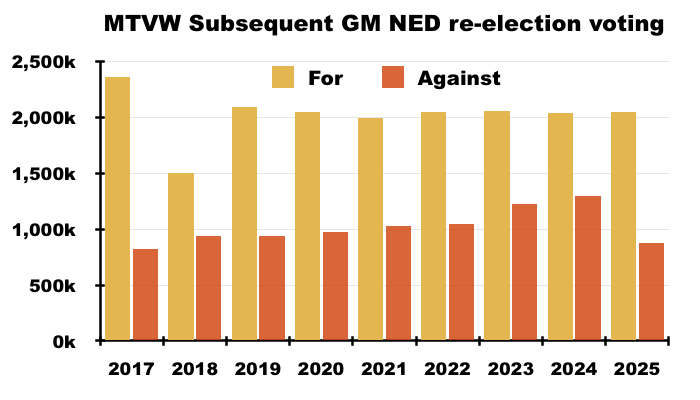
- Held earlier this month, the 2025 GM attracted less than 900k protest votes — equivalent to only 22% of the share count and the lowest proportion since 2017 (21%).
- I am not sure why more than 400k protest votes disappeared between the 2024 GM and the 2025 GM. I can only presume the Murphy family (and connected parties) and/or Talisman did not vote with their entire shareholdings.
- Stock-market rules dictate any company incurring a 20%-plus AGM/GM protest vote has to contact the unhappy investors and publish an update to all shareholders within six months.
- Six months after the 2024 AGM, during February, MTVW announced:
[RNS February 2025] “Following the 2024 AGM, and as it has done previously, the Company identified as far as possible those shareholders who did not support the various resolutions and attempted to engage with them to seek their views. Some shareholders did not wish to engage. The Company remains committed to shareholder engagement and we will continue to offer to have discussions with shareholders and will take into account their concerns and considerations in the future.“
- Six months after the 2024 GM, during May, MTVW announced:
[RNS May 2025] “Following the General Meeting, and as it has done previously, the Company identified, as far as possible, those shareholders who did not support the resolutions and attempted to engage with them to seek their views. Some shareholders did not wish to engage, other shareholders raised matters which are under consideration by the Board and its Committees. The Board is grateful to those shareholders who took part in the engagement process and value the feedback provided. The Company re-affirms its commitment to ongoing shareholder engagement and will continue to offer to have discussions with shareholders and will take into account their concerns and considerations in the future.”
- MTVW’s “commitment to ongoing shareholder engagement” does not appear to have any great relevance. After all, 18 20%-plus AGM/GM protest votes since 2017 suggest engaging with the board has become a futile undertaking.
- The ineffective protest votes have not yet persuaded the Murphy family to sell; Companies House indicates Margaret Murphy has maintained a 500k-plus MTVW shareholding since at least 1979:
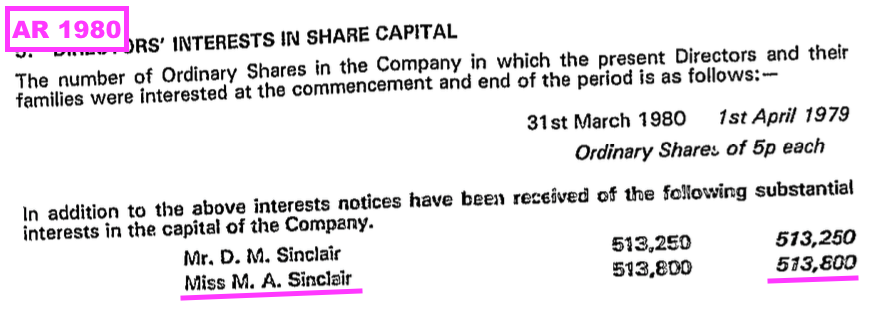
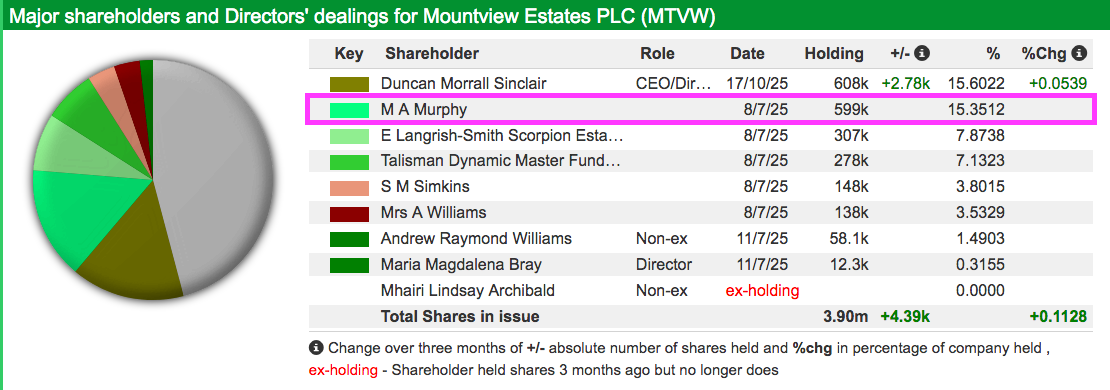
- Talisman has not announced any selling since reporting its last purchase during January 2023:

Boardroom: new non-executive and executive pay
[RNS November 2024]
“Mountview Estates P.L.C. announces that Tracey Hartley MSc MBA MRICS FTPI has been appointed as an independent Non-Executive Director of the Company, with effect from 1 January 2025. Tracey will join the Audit and Risk Committee, Remuneration Committee and Nomination Committee on appointment.
Tracey has over 25 years of expertise in residential property investment, property, and asset management across Estate, Block, and Build to Rent (BTR) sectors. She has also established a strong track record in senior leadership, strategy, and operations.
Her career includes a decade in Operations and Fund Management roles at Grainger, and she has served as the Head of Residential at The Howard de Walden Estate, JLL – The Crown Estate, and Chief Operating Officer at Cortland Europe before joining CompassRock International as Senior Director – Operations in June 2024.
Tracey has a keen focus on governance, risk, and compliance, ensuring best practices are followed across all levels of operations. Her industry-shaping roles include participating in the Government’s Private Rented Sector (PRS) Taskforce, serving as the current Chair of the British Property Federation (BPF) Residential Management Committee, being a member of the BPF Living Sectors Board and the RICS UK & Ireland World Regional Board.
Duncan Sinclair, Chief Executive Officer, commented:
“Tracey brings a wealth of relevant experience to the board. We welcome her to Mountview and look forward to working with her.”
- This insightful interview reveals Ms Hartley’s unconventional early career that involved a weekend job at an estate agent and obtaining a degree through the Open University.
- I therefore trust Ms Hartley brings some fresh thinking and differing opinions to the board.
- Indeed, Ms Hartley’s “keen focus on governance, risk, and compliance, ensuring best practices are followed across all levels of operations” could make her a welcome appointment for unhappy shareholders…
- …assuming her adherence to corporate-governance “best practices” rubs off on MTVW’s board!
- This FY noted six contraventions of the 2018 corporate-governance code. The non-compliances concerned the:
- Independent non-exec directors;
- Appointment of a senior non-executive director;
- Composition of committees in general;
- Board evaluation and diversity;
- Role concurrence — audit committee, and;
- Remuneration of the chairman.
- Ms Hartley was asked at the 2025 AGM about her opinion of MTVW’s six corp-gov non-compliances. She told attendees she would be happy for shareholders to contact her about any corp-gov concerns and that the board would be undertaking a “deep dive” with the new 2024 corp-gov code.
- Ms Hartley is deemed ‘independent’ of the Sinclair family concert party, and she could therefore act as a conduit between the board and the Murphy family, Talisman and other unhappy shareholders.
- The Murphy family, Talisman and other unhappy shareholders did not give Ms Hartley the benefit of the doubt at the 2025 AGM.
- Ms Hartley attracted a 36% protest vote at the 2025 AGM that required the Sinclair family concert party to re-elect her at this month’s follow-up GM:
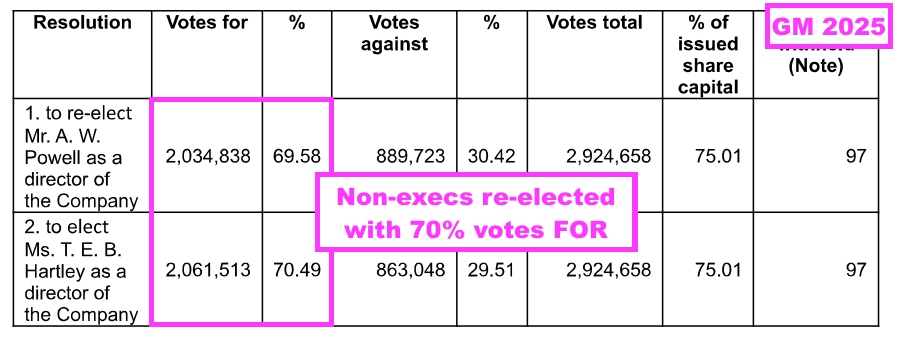
- Ms Hartley was asked at the 2025 AGM about her understanding of the protests votes against her predecessor. Ms Hartley told attendees:
- “I am here to be non-partisan and to deal with the facts“;
- “I deploy constructive criticism and ask lots of questions in board meetings“;
- “I will endeavour to do my best“, and;
- “I am aware of some of the context behind the protest votes”.
- Ms Hartley was asked at the 2025 AGM about the 2014 Allsop valuation and the lack of a follow-up assessment. She told attendees:
- In contrast to a former employer (property group Grainger), valuations are not required at MTVW;
- Valuations are “snapshots” that become “less relevant” over time, and;
- “I have spent too much time over the last six months trying to understand why we’re fixated on the 2014 valuation and the relevance of it.”
- I can’t say I was impressed by Ms Hartley’s implication that some shareholders are overly “fixated” about the 2014 valuation.
- I am “fixated” on the 2014 valuation because:
- It is the only independent information provided to outside shareholders to judge the market value of the property estate, and;
- A follow-up would double-check whether the properties bought since that valuation are likely to realise the gains the board believes they can.
- Perhaps Ms Hartley would pay more attention to the 2014 valuation — and the absence of a follow-up — if she invested her own money to become a MTVW shareholder.
- From what I could tell from my AGM attendances, Ms Hartley’s predecessor never argued for a follow-up valuation… and she ended up selling her MTVW shares at £88.50 after buying them at an average £129:
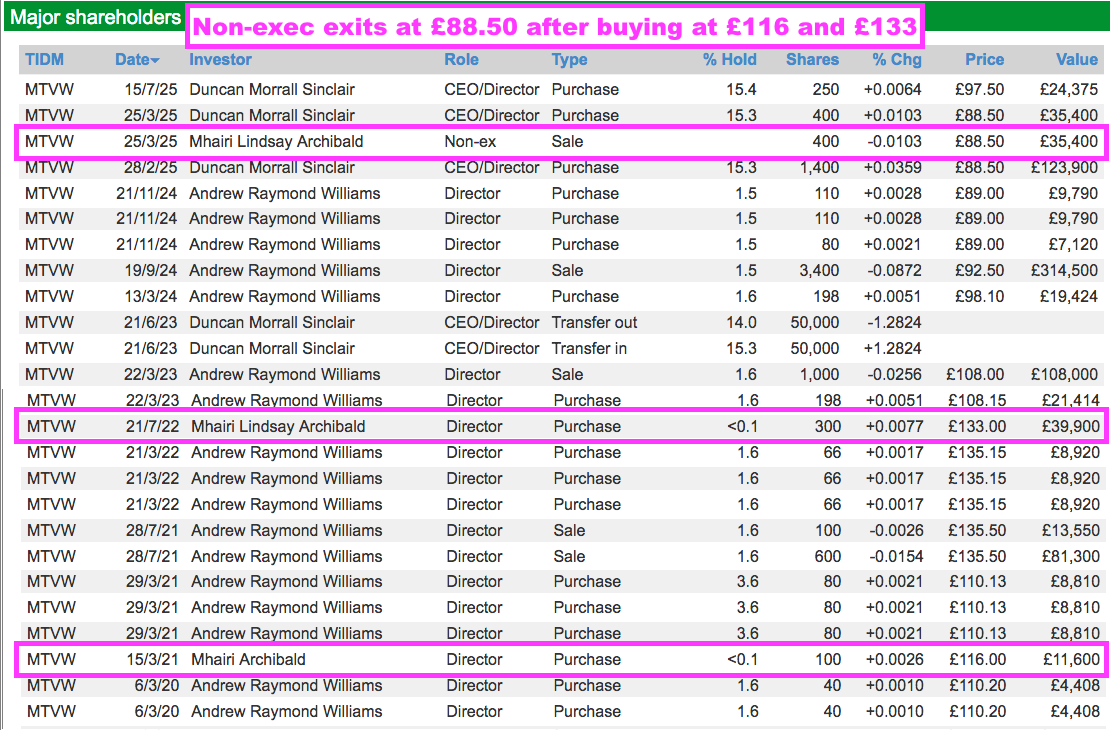
- Earlier this year, MTVW extended the “period of overlap” between Ms Hartley and her predecessor from three to seven months:
[RNS March 2025]
“The Company stated in its Annual Report and Accounts for the year ended 31 March 2024 that the Nomination Committee had extended the contract of Ms. Mhairi Archibald, a non-executive director, to 31 March 2025 to allow time for a replacement to be found and allow a period of overlap to ensure a smooth and seamless transition of Ms Archibald’s role and duties as chair of the Remuneration Committee and her other committee membership roles and responsibilities.
The Nomination Committee has decided to extend this transition period, and Ms. Archibald’s contract, until the conclusion of the Company’s next Annual General Meeting on 13 August 2025 when she will step down as a director.”
- During the 2025 AGM, Craig Murphy (representing the Murphy family) suggested the extended “period of overlap” was due to Ms Hartley being “not up to the job” and “not in a position to take on all of her expected responsibilities“.
- Mr Murphy added MTVW was “not a training ground” for non-execs unable to “get up to speed within three months“.
- Board remarks at the 2025 AGM claimed Ms Hartley’s extended “period of overlap” was due to the group’s remuneration policy review. Ms Hartley’s predecessor had overseen this triennial process before as remuneration-committee chair, and the board decided to let Ms Hartley’s predecessor complete the latest review.
- Two days after the 2025 AGM, MTVW announced Dr Williams had been appointed as “acting” remuneration-committee chair:
[RNS August 2025] “Mountview Estates P.L.C. announces that Dr Andrew Williams has been appointed as the Acting Chair of the Remuneration Committee with immediate effect. Dr Williams succeeds Ms Mhairi Archibald who stepped down as a non-executive director of the Company at the conclusion of the Annual General Meeting on Wednesday as well as stepping down as Chair of the Remuneration Committee and as a member of the Audit and Risk and Nomination Committees.”
- Dr Williams becoming “acting” rem-comm chair suggests he will remain in that role for a limited time only. I assume he will then hand over the role to Ms Hartley.
- Ms Hartley has already served as a non-exec for almost eleven months, and the longer Dr Williams stays as “acting” rem-comm chair, the more outside shareholders will speculate whether Ms Hartley:
- Really is “not up to the job” of serving as a non-exec, or;
- Has been asking too many awkward questions about board pay to become rem-comm chair.
- Rem-comm chair is of course a vital board position given the history of executive pay.
- In particular, chief executive Duncan Sinclair has collected a bonus every year since at least FY 2001, and such bonuses have pushed his total pay beyond £1m since FY 2020:
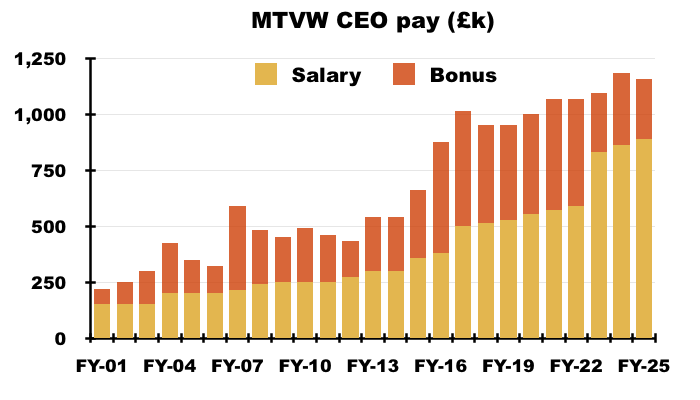
- I am not quite sure whether a bonus is truly a bonus if such a payment is made every year.
- This FY suggested bonuses were assessed partly on pre-tax profit:
“In reviewing the bonus figures for the year, the Remuneration Committee has adopted the approach used in prior years of taking into account the financial metrics of the Group (primarily profit before tax), non-financial factors and, where relevant market benchmarks and trends. In light of the decrease in Profit before Tax for the year 2024/25, the Remuneration Committee set the bonus awards at £270,000 and £225,000 for the CEO and CFO respectively.”
- The chief exec’s basic pay was lifted 3% to £890k for this FY:
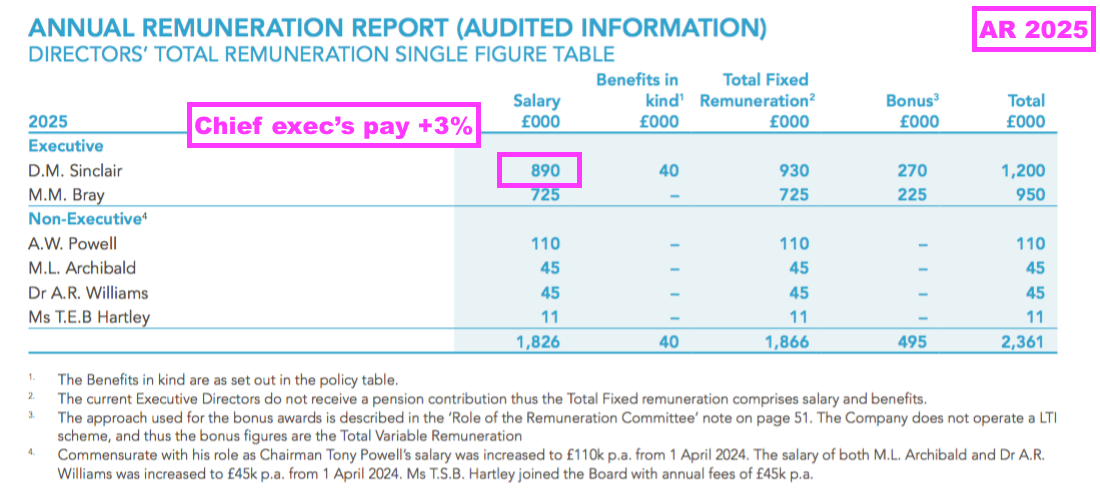
- The feeling among many AGM attendees over the years is the executives are paid generously for essentially:
- Putting vacant properties into auction;
- Collecting rent, and;
- Buying properties during recent years that may not have earned material gains on disposal.
- Mind you, while the chief exec’s basic pay has been lifted by an underlying 18% during the five years to this FY…
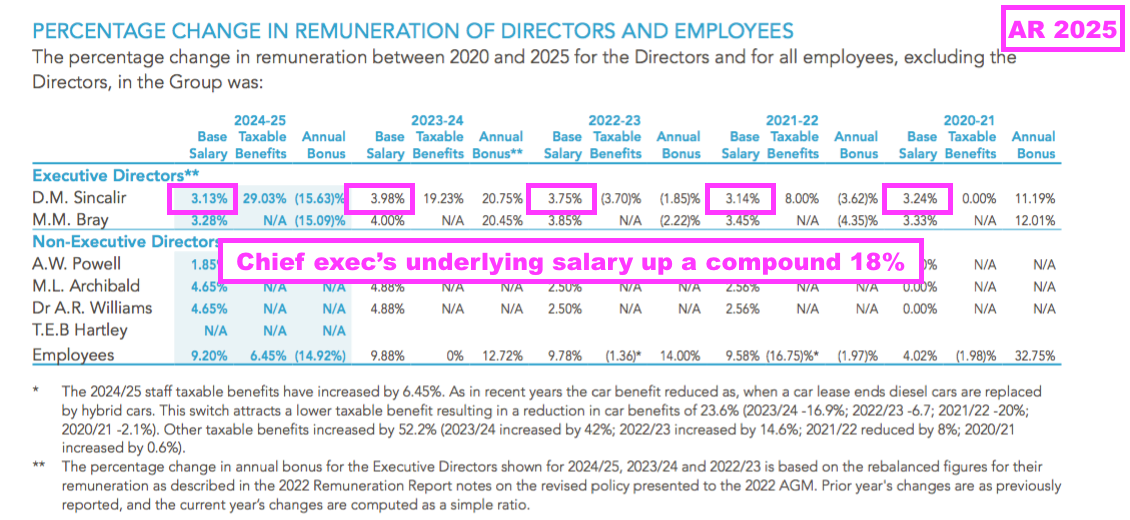
- …the ordinary dividend has advanced 31% during the same five years.
- MTVW is the only company I know that includes executive-remuneration ratios within its annual reports:
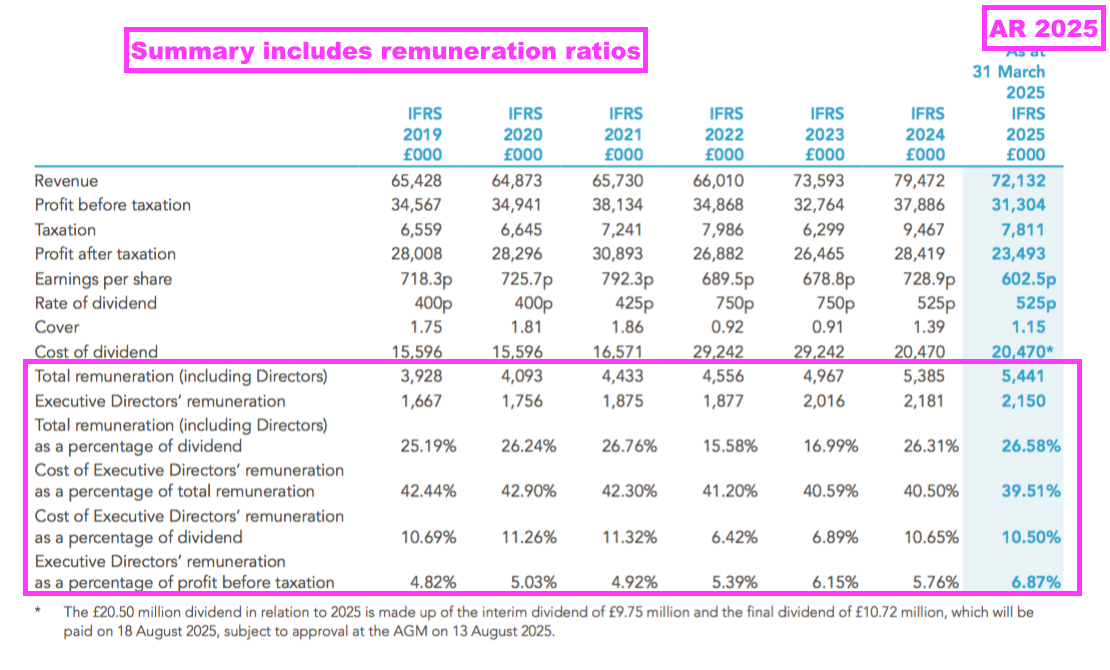
- The remuneration ratios may not be strictly accurate, as the executive-remuneration figures exclude the associated social security costs:
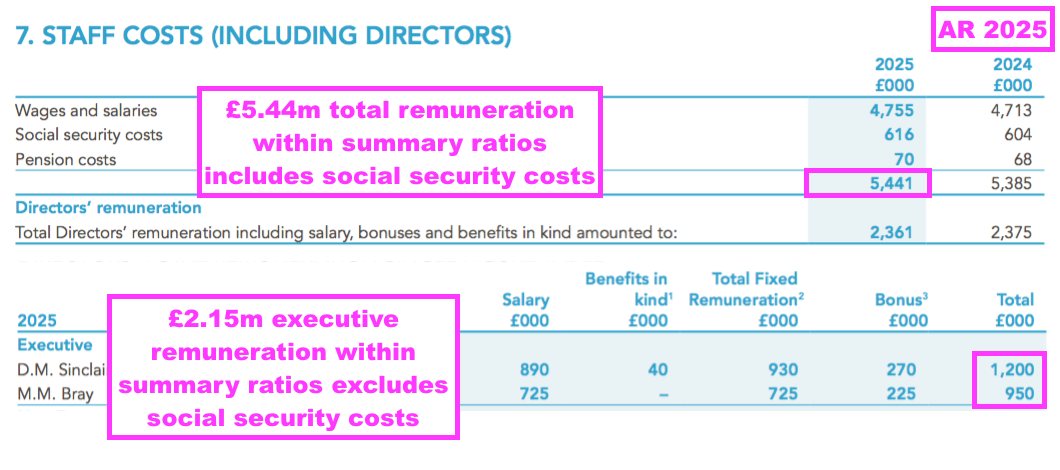
- Executive pay during this FY absorbed approximately 0.5% of NAV, which does not sound a lot…
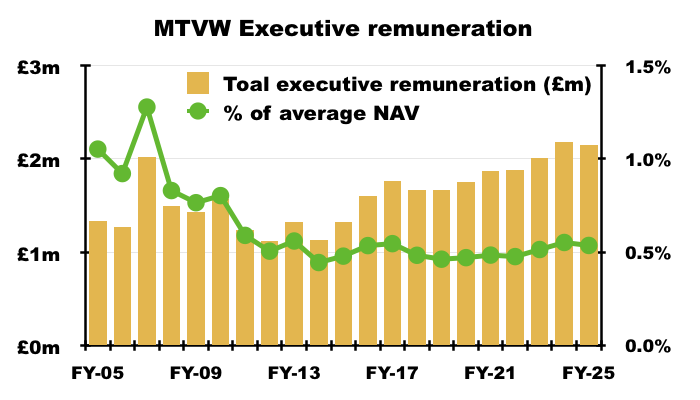
- … but starts to add up when NAV has advanced by just 6% — or 1.2% per annum — during the five years to this FY.
- A positive about the board’s remuneration is the absence of a share-option scheme. MTVW has in fact not issued any new shares since at least 1979.
- I suppose the alternative to the current executive set-up is to replace it with lower-paid ‘conventional’ executives, although any salary/bonus savings made could well be offset by additional ‘conventional’ overheads (including an option scheme!) creeping into the business.
Sinclair family concert party
- The Sinclair family concert party is led by chief executive Duncan Sinclair, and the party outvoting unhappy shareholders for nine years proves the arrangement effectively controls the group.
- MTVW first formally mentioned the concert party during FY 2005, at which point the aggregate party shareholding was “approximately 53%“.
- The last update on the aggregate shareholding occurred during November 2022 and declared a 50.4% ownership.
- Anray Limited (associated with Mrs Angela Williams)
- Mrs Elizabeth Langrish-Smith
- Mrs Emma Adjaye
- Mr James Langrish-Smith
- Mr Matthew Langrish-Smith
- Scorpion Estates Limited (associated with Mrs Elizabeth Langrish-Smith)
- Mrs Susan Mary Simkins
- Mr Ronnie Simkins
- Miss Louise Simkins
- Mr Thomas Simkins
- Whitehart Holdings Pty Ltd (associated with Mr Alistair Sinclair)
- Viewthorpe (Old) Limited (associated with Mr Alistair Sinclair)
- Mr Duncan Sinclair
- Sinclair Estates Limited (associated with Mr Duncan Sinclair)
- The Sinclair Charity (associated with Mr Duncan Sinclair)
- Viewthorpe (Subco2) Limited (associated with Mrs Susan Mary Simkins)
- Mrs Angela Williams
- Mr Rupert Williams
- Courtland Capital Limited (associated with Mr Rupert Williams)
- Frank & Daphne Sinclair Grandchildren Settlement
- Leading concert-party members Mr Alistair Sinclair, Mrs Elizabeth Langrish-Smith, Mrs Angela Williams and Mrs Susan Simkins are children of MTVW co-founder Frank Sinclair.
- Chief executive Duncan Sinclair is the son of MTVW co-founder Irving Sinclair.
- I understand every other concert-party member listed above is a relation of either Mrs Elizabeth Langrish-Smith, Mrs Angela Williams or Mrs Susan Simkins.
- The question for unhappy shareholders is how long can the Sinclair family concert party remain intact to retain effective control of the group?
- Companies House reveals the leading party members are between 70 and 78 years old:
- Duncan Sinclair (born October 1947);
- Mr Alistair Sinclair (born September 1949);
- Mrs Elisabeth Langrish-Smith (born April 1952);
- Mrs Angela Williams (born April 1952), and;
- Mrs Susan Simkins (born May 1955).
- At some point the collective 50.4% will be controlled entirely by younger members of the Sinclair family, who may have an alternative approach to handling a £181m aggregate investment.
- Assuming the concert party’s ownership remains at 50.4%, concert-party members need only sell approximately 15k shares (to raise £1.4m at £92 a share) for the concert party’s stake to fall below 50%…
- …which may then allow the concert party to be outvoted.
- No wonder board remarks at both the 2024 AGM and the 2025 AGM about the concert party’s holding were limited to simply “It’s over 50%“.
- Note that the concert party’s voting power is assisted by ordinary shareholders voting in favour to re-elect the ‘independent’ non-execs. Such shareholders represented 6-7% of the share count at the 2025 AGM:
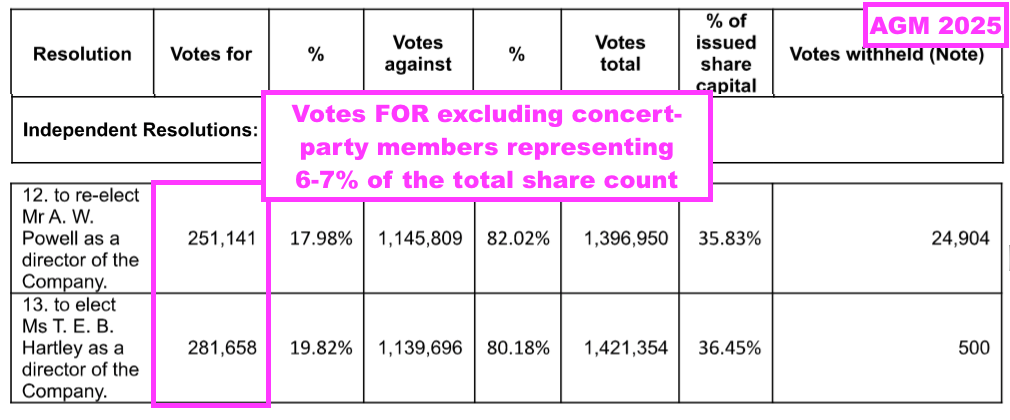
- Mr Sinclair has been doing his bit to shore up the concert party’s holding.
- Including the shares held by Ms Hartley’s predecessor, Mr Sinclair has bought almost 12k shares for approximately £1.1m since February:
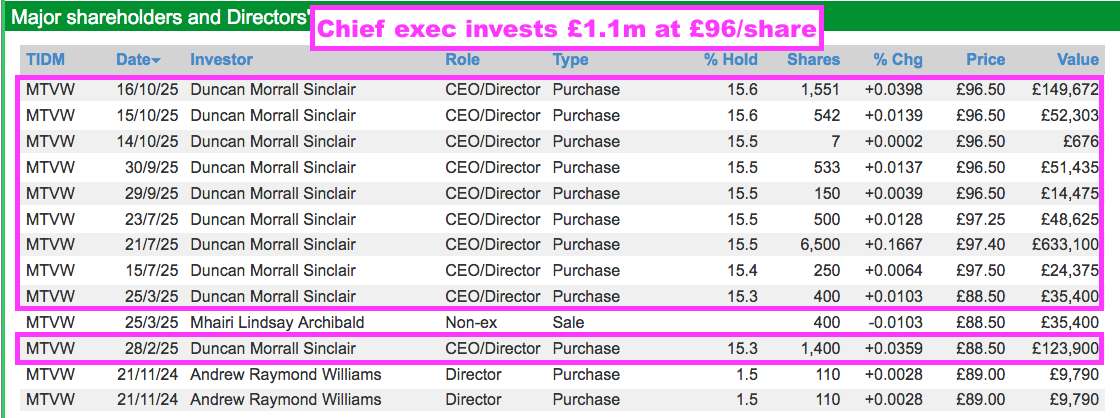
- £1.1m compares to Mr Sinclair’s annual £3m dividend from his 16%/£56m shareholding.
- Prior to this year, Mr Sinclair last bought MTVW shares during 2011 at £40.50 and before that during 2009 at £23:
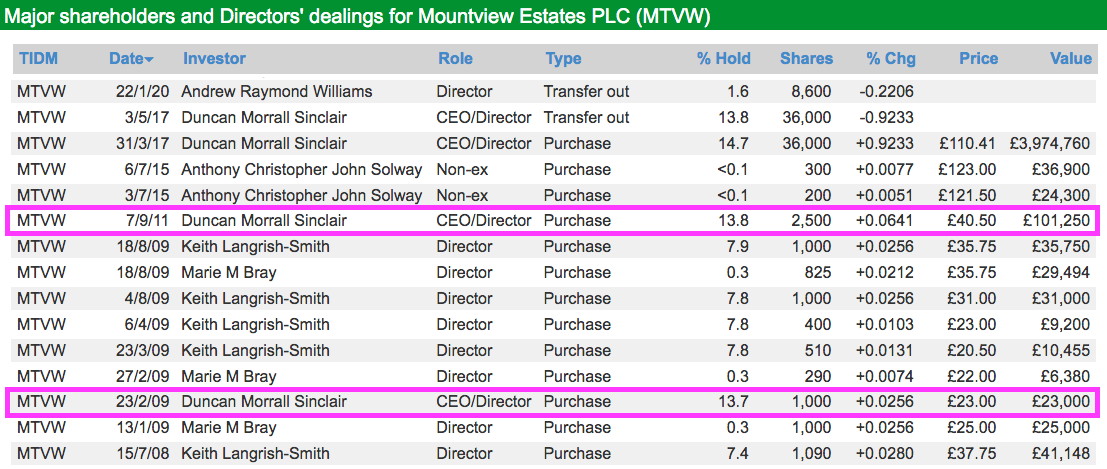
- I trust Mr Sinclair’s infrequent purchases are signals for when he finds the share price very attractive (see Valuation).
- This FY and the comparable FY said Mr Sinclair was a “former” fellow of the ICAEW:
“MR D.M. SINCLAIR (CEO)
Joined the Company as Company Secretary in 1977, became a Director on 1 January 1982 and succeeded his late father as Chairman on 5 June 1990. Retained the position of Chief Executive (CEO) when the roles of Chairman and CEO were split into separate roles in 2013. Former Fellow of the Institute of Chartered Accountants in England and Wales (ICAEW).”
- I am not sure why Mr Sinclair would relinquish his ICAEW fellowship when he is still employed as a quoted company’s chief executive.
- Craig Murphy asked about Mr Sinclair’s former ICAEW fellowship during the 2024 AGM. Mr Sinclair told Mr Murphy:
[AGM 2024]
“I think that is a question about my private life. I refuse to answer it, and you should not have the impertinence to ask it.”
- I trust Mr Sinclair was not forced to relinquish his ICAEW fellowship because he contravened the organisation’s bye laws.
- From what I can tell from my AGM attendances and messages via my contact page, the concert party has not lined up a family member to one day succeed Mr Sinclair as chief executive.
- Back in FY 2014, MTVW’s then chairman had indicated succession planning was underway:
[FY 2014]
“Duncan Sinclair has been with the Company for 43 years, during which he has occupied the positions of Company Secretary, Director, Executive Chairman and Chief Executive. The Company has grown and developed significantly since Duncan became Chief Executive in 1990. The search to find and establish Duncan’s successor is on going and now intensifying. This is an important phase in the Company’s development.“
- But a year later that chairman had left and Mr Sinclair said he was staying put:
[FY 2015]
“Our management teams continue to evolve and it may become appropriate to appoint one or more of these personnel to the Board. The continuing good results and the sound financial structure of the Company are a testimony to tried and trusted methods and tried and trusted personnel. Whilst we are aware of the need for our management structure to evolve for the future benefit of the Company, our results do not suggest that radical surgery is needed as a matter of urgency.
“The default retirement age has been abolished and shareholders will be aware that many companies are being well served by men and women who would once have been regarded as being of advanced years. I may be considered to fall into this category, but I will be happy to step aside when we have in position those of proven ability who are capable of producing results at the level for which I have been responsible for an extended period of years.“
- With Mr Sinclair still in charge today, that FY 2015 text suggests MTVW has never found anybody to match his “proven ability”.
- At some point of course, a new chief executive will be needed and, without an obvious family successor, the Sinclair family concert party could be at risk of losing its grip on the boardroom.
- But the wait for a leadership change could be protracted. Mr Sinclair is 78 and his father, co-founder Irving Sinclair, retired from the board at 86.
- Still, MTVW has always been a company for long-haul investors. The group was established during 1937 and floated during 1960, since when the shares have climbed from (an estimated) 11p to £92 with almost another £70 per share of dividends declared along the way.
- Family shareholders (even unhappy ones) have generally kept their shares through thick and thin… attracted presumably by the genuine asset backing, reliable dividend and the prospect one day of a trade sale when family leadership is no longer available.
- Board remarks during the 2024 AGM provided encouragement that a trade sale may one day occur. When asked about what happens to MTVW when the shrinking pool of regulated tenancies finally disappears, the chief executive said:
[AGM 2024]
“We will have to consider what else to do. It could be that we just gradually pay dividends and ultimately return the capital and wind up the company in that manner. On the other hand, there may be another company that has other specialisations but is very capable of taking the rump of our portfolio, who may come in and buy that rump. We’re not very near that date yet.“
- In the meantime, one could surmise while MTVW patiently waits for its regulated properties to be vacated to earn a suitable return…
- …unhappy shareholders are patiently waiting for the boardroom to be vacated to earn a suitable return.
Valuation
- I calculate the shares could be worth either £176 or £171 were all of the group’s regulated tenancies to end immediately and the properties then sold at a fair market value.
- The following table outlines my £176 sums, which overlook this FY’s additional cost-of-sales information:
| Property stock Sept 2014 (£k) | 317,651 |
| Less sold Allsop-assessed stock (£k) | (149,942) |
| Remaining Allsop-assessed stock (£k) | 167,709 |
| Allsop-premium-to-book | 2.10x |
| Sold-premium-to-Allsop | 1.44x |
| 506,211 | |
| Stock purchased since Sept 2014 (£k) | 287,005 |
| Sold-premium-to-book | 1.13x |
| 337,944 | |
| Possible property stock value (£k) | 844,155 |
- I have taken the estate’s September 2014 value of £318m and subtracted the aforementioned (estimated) £150m book value of Allsop-assessed properties sold since that date.
- I then multiplied the £168m remainder by:
- The 2.1x ‘Allsop-premium-to-book’ multiple, and;
- The 44% ‘sold-premium-to-Allsop’ gain that was realised during this FY.
- I arrived at a £506m ‘vacant possession’ value for all of MTVW’s properties that were owned at September 2014 but have yet to be sold.
- My earlier calculations indicated MTVW could have acquired additional properties with an estimated £299m book value since September 2014.
- I have assumed these additional properties will be sold at a 13% premium to their £299m book value — i.e. £338m — based upon my aforementioned analysis of properties bought and then sold since the Allsop assessment.
- Adding the £506m and the £338m together gives £844m.
- This next table adjusts that £844m for 25% taxation, the £22m conventional property portfolio, the £80m debt and the residual other liabilities of £6m to give a possible NAV of £686m or £176 per share:
| Possible property stock value (£k) | 844,155 |
| Less tax at 25% (£k) | (94,345) |
| Plus other investments (£k) | 21,670 |
| Less debt (£k) | (80,102) |
| Less net other liabilities (£k) | (5,687) |
| Possible NAV (£k) | 685,691 |
| Possible NAV per share (£) | 175.86 |
- The following table outlines my £171 sums, which apply this FY’s additional cost-of-sales information:
| Property stock Sept 2014 (£k) | 317,651 |
| Less sold Allsop-assessed stock (£k) | (174,854) |
| Remaining Allsop-assessed stock (£k) | 142,797 |
| Sold-premium-to-book | 2.69x |
| 384,223 | |
| Stock purchased since Sept 2014 (£k) | 323,997 |
| Sold-premium-to-book | 1.34x |
| 434,189 | |
| Possible property stock value (£k) | 818,411 |
- For these £171 sums, I have taken the estate’s September 2014 value of £318m and subtracted my alternative (estimated) £175m book value of Allsop-assessed properties sold since that date.
- I then multiplied the £143m remainder by the aforementioned 2.69x ‘sold-premium-to-book’ multiple for Allsop-valued properties.
- I arrived at a £384m ‘vacant possession’ value for all of MTVW’s properties that were owned at September 2014 but have yet to be sold.
- My earlier alternative calculations indicated MTVW could have acquired additional properties with an estimated £324m book value since September 2014.
- I have assumed these additional properties will be sold at a 34% premium to their (estimated) £324m book value — i.e. £434m — based upon this FY’s additional cost-of-sales information.
- Adding the £384m and the £434m together gives £818m.
- This next table adjusts that £818m for 25% taxation, the £22m conventional property portfolio, the £80m debt and the residual other liabilities of £6m to give a possible NAV of £666m or £171 per share:
| Possible property stock value (£k) | 818,411 |
| Less tax at 25% (£k) | (87,909) |
| Plus other investments (£k) | 21,670 |
| Less debt (£k) | (80,102) |
| Less net other liabilities (£k) | (5,687) |
| Possible NAV (£k) | 666,383 |
| Possible NAV per share (£) | 170.91 |
- Neither my £176 per share nor my £171 per share NAV sums are perfect, and the following questions remain unanswered:
- How long will MTVW take to sell all of its properties?
- Will future house-price inflation compensate for being unable to sell all the properties immediately?
- Will future property purchases deliver returns exceeding debt costs at approximately 6%?
- Will the property-sales gross margin decline from less than 60% to perhaps less than 50%?
- MTVW’s shares have traded below NAV for almost the last two years:
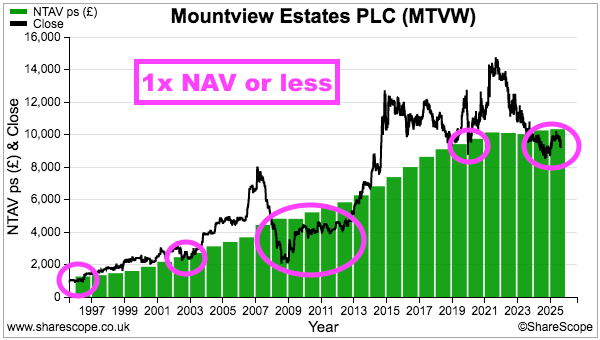
- The best time to buy should be when the market cap trades at or below NAV, at which point no future gains from any property purchases are priced into the valuation.
- What future gains could lie ahead?
- As noted earlier, the combined additional NAV and dividend return over the five years to this FY was £136m or 36% — equivalent to a 6.3% CAGR:

- The next five years repeating that 6.3% CAGR may not enthuse prospective investors given:
- MTWV’s combined NAV and dividend returns have been declining over time;
- Property-sales gross margins now seem destined to remain below 60%;
- Ongoing protest votes have not persuaded the board to conduct a new Allsop-type valuation, and;
- New EPC (and other?) legislation will probably increase costs and reduce future returns.
- Perhaps a discount to NAV is actually now required for investors to generate a suitable total return.
- The £92 shares trade at a 11% discount to this FY’s £103 per share NAV:
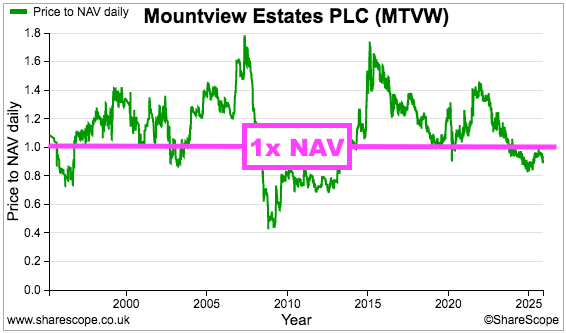
- A 11% discount appears good value, and is close to the 14% discount enjoyed by the chief executive when he purchased shares at £88.50 earlier this year:

- For further perspective, my original MTVW purchase occurred during 2011 when the £42 shares traded at a 24% discount to the then £55 per share NAV.
- For even further perspective, the shares sank to £21 at the depths of the 2008 banking crash, giving buyers a 56% discount versus the then £48 per share NAV.
- MTVW’s shares have not always traded at a discount.
- In particular, the 2014 Allsop assessment pushed the shares to £125 during early 2015 as buyers paid a 69% premium to the then £74 per share NAV:
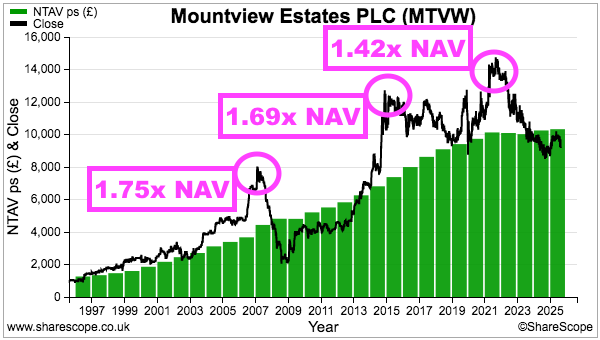
- Another Allsop assessment divulging further ‘hidden value’ could easily prompt a favourable price-to-NAV re-rating.
- Occasional bouts of wider market optimism can also push the share price well beyond NAV. In particular:
- Buyers at the £80 peak during 2007 paid a 75% premium to the then £46 per share NAV, and;
- Buyers at the £145 peak during 2021 paid a 42% premium to the then £102 per share NAV.
- At least future returns from today should be front-loaded by dividends:

- The illustrious ordinary payout stands at 525p per share and supplies a useful 5.7% income at £92.
Maynard Paton

Perhaps the budget on Wednesday might contain some “help” for the housing sector, and thus drive a few more years of house price appreciation, thus helping Mountview shares!
Thank you again Maynard for a very in-depth review of the latest results from Mountview.
Thanks Boon. Yes, let’s see what the Budget has in store! Fingers crossed the extra tax burden we will have to shoulder is not as great as the speculation has suggested.
Maynard
Mountview Estates (MTVW)
AGM attendance 13 August 2025
Below are my notes from MTVW’s 2025 AGM. All six directors were present, including non-exec Ms Archibald, who stepped down after the meeting. Attendees numbered at least 20, including various concert-party members. Questions were asked by Craig Murphy, myself plus a number of other shareholders — including a rare question from a concert-party member.
The meeting was once again recorded on audio — certain major shareholders do not get on and disagree about the group’s corporate governance, board membership and other matters. A recording could therefore be useful as to who said what. My notes are paraphrased/summarised.
The meeting was the usual lively affair, with almost all the questions and statements from the floor including — or at least politely implying — scepticism of the group’s progress. Non-exec Dr Williams maintained his record of not speaking during any AGM I have attended (total now 5).
MTVW’s chairman does not formally disclose the voting results ahead of the Q&A, which is unfortunate as a number of resolutions attract significant protest votes and could prompt useful meeting questions were they to be announced beforehand.
In particular, this year witnessed 292k votes against declaring the final dividend. 292k shares = 7.5% of the share count and I speculate Talisman (last reported holding 278k shares) is behind that voting. Previous years have not seen any great vote against the dividend, although 2022 did witness a 58k/1.5% payout protest.
I can only presume Talisman has become very unhappy with MTVW. Of this AGM’s 11 resolutions, 10 attracted at least 292k votes against with only ‘to receive and consider the annual report and accounts’ escaping any disapproval. Would have been useful to ask at the meeting what the board understood about the large vote against the dividend. After all, the dividend now seems to be the only source of return for shareholders!
MTVW’s last concert-party update revealed the concert party owned 1,964,199 shares, but not every concert-party member voted at this AGM.
For example, votes for the chairman were 2,019k but included 251k from independent shareholders. So concert-party members supplied the chairman 1,768k votes, leaving 196k concert-party votes (5% of the share count) not cast for the chairman.
Anyway, here are the full voting results.
(CM: Craig Murphy; DS: Duncan Sinclair (chief executive); TH: Tracey Hartley (non-exec); MTVW: Chairman; MP: Maynard Paton; Q: Another shareholder)
—————
CM: Results give cost of sales split between properties purchased pre-valuation and post-valuation. But one data point not helpful. Board should publish all annual splits since the valuation. Otherwise impossible to judge quality of purchases made. Suspect recent purchases are not that flattering. Will the board publish the splits since the valuation?
MTVW: Comment is noted. Will be an agenda item for upcoming board meeting. Will discuss what information we may or may not have. Won’t commit to anything without board discussion.
MP: For this year, a 63% gross margin was achieved on the properties purchased before the valuation and 25% was achieved on the purchases after the valuation. How do those numbers broadly compare to previous years?
MTVW: Gross margin on post-2014 figures is a little higher than in the previous years. As time passes, more potential stored value comes through.
MP: Does the board still aim to buy properties at a 25% discount to vacant possession value, assuming you get the possession the next day?
MTVW: With the headline price, yes. Costs associated with purchase eat into the return before we earn a profit at sale.
Q: When did the company last have a strategic review? Seems to make sense to buy shares for cancellation given that the price is below NAV and considerably below the market-value NAV?
MTVW: “Strategic review is an interesting term“. Consider our strategy annually. “Take soundings with the concert party as to whether they’re content.”
Full strategic review undertaken in the 2010s. Looked at various options. Concluded to stay focused on regulated tenancies. Remains the same now. Topic of share cancellation discussed at board meetings, often following shareholder questions. Something that will be considered. But not something immediately likely.
Q: Makes sense to buy shares for cancellation at less than NAV versus buying actual properties.
MTVW: Comments are noted. Always looking for the best use of funds. Try to operate within £90m debt headroom. Target is to maintain gearing below 25%. Must consider debt when deciding what to do with surplus cash.
CM: Results show a £55k charitable donation. How was that a better use of funds rather than distributing it to shareholders?
MTVW: Donation to London Air Ambulance. Have a history of making charitable donations. Not unusual for companies. Will continue donating to charities.
CM: Board is selecting a charity rather than shareholders. If the money is distributed, shareholders can then choose to donate. Shareholder money is being used for something unconnected to the business.
MTVW: Comments are noted. Not an unusual practice for companies to make charitable donations. Will include topic on a future board agenda.
Q: Each year we have an EGM. What is the cost of the meetings? We’re just wasting our money each year.
[MP note: question was asked by concert-party member Ray Williams]
MTVW: First EGM was 2017. Cost about £50k a meeting.
CM: Board’s decision to have an EGM, because the board deems some non-executive directors as independent. If board ceased deeming the non-execs as independent, would be no need for the EGMs. Board can avoid these EGMs.
MTVW: Point is noted. But majority of the shareholders wish to keep the board composition. That’s why we hold the EGMs, which are triggered by adverse votes on the last two resolutions.
CM: Adverse votes are from the independent shareholders. If board accepts independent shareholders have no confidence in the independent non-execs, no need to have the EGMs and could save £50k.
MTVW: Comment is noted.
MP: Property-sales gross margin has been less than 60% for the last four years now, a run that has not happened in the previous 20 years. Looks like sub-60% may now be the new normal. What’s the board’s view?
[MP note: the chairman now claimed my blog had stated the last time the property-sales gross margin had been less than 60% for four consecutive years was the four years to 2020. As per my blog post above, I have double-checked my earlier MTVW posts and I did write the four years to 2000. So no typo!]
MTVW: Properties bought many years ago give an “extremely high gross margin“. Now being replaced by properties bought at a 25% discount, and so margin over time should drift lower. Also operating in a relatively stagnant market.
“Not a surprise” to see a lower gross margin because of the mix of properties sold. But could move above 60% because exactly which properties become vacant at any time is unpredictable.
“It’s a question of maths.” Margins will reduce because properties bought on substantial discounts are replaced by properties bought on smaller discounts.
MP: How has the 25% discount changed over time? Were you buying at 30% or 35% years ago?
DS: Could buy properties historically at 50% of vacant possession value. Have suffered extra burdens such as stamp duties. Until enough houses are built, will be competition for limited supply and therefore property price inflation. Longer a property is held, the bigger the margin made.
Q: Vacancy rate was 6% for many years, now close to 4%. Would have expected the vacancy rate to go up over time. Vacancy rate important because they generate the sales. What has changed to the vacancy rate?
[MP note: Not sure if I have the figures right here, but I think this question’s reference to ‘vacancy rate’ could be comparing the book value of trading properties sold in any year versus the the book value of all trading properties at the start of that year. For FY 2025, the calculation was £25.6m/£446.4m = 5.3%. This vacancy-rate ratio has bobbed between 3.57% and 6.91% since FY 2010, so I am not sure there has been a major deterioration of late.
Alternatively, I calculate 139 regulated tenancy properties were sold during FY 2025, and versus 1,836 held at the start of the year gives a vacancy rate of 8%. The same calculation was 6% or 7% between FY 2014 and FY 2024.
Mind you, the number of properties bought and sold may be distorted because MTVW excludes certain properties from its tallies (see later question).
Still, vacancy rate is an important point that I have not really considered in my blog posts. If vacancies dry up completely for a time, there would be no property sales to pay the dividend!]
MTVW: Should be delighted our tenants are living longer! Recognise a consequence for the business. Does mean short-term revenues go down because don’t get the opportunity to “unleash the hidden locked-in value“. But that value is stored for the future.
Not aware of any bias with purchases/sales or some incredible change to the health service. DS says “the law of averages works out over time“. Will be ups and downs. Something completely outside of our control.
New laws make it harder to get vacant possession when someone challenges our ownership. Have cases where relatives seek right of succession where there is no right. Now much harder to get those cases into court and get the vacant possession.
Law of averages. Could in five years will find more vacant possessions.
CM: Ms Hartley was appointed as a director on 1st January as a replacement for Ms Archibald with a three-month handover period. Then on 31st March, Ms Archibald’s contract was extended by 4.5 months. That extension tells me Ms Hartley was not up to the job of non-exec and was not in a position to take on all of her expected responsibilities.
This is a listed company and therefore not a training ground for people who are unable to get up to speed within three months. Is it appropriate that Ms Hartley stays on the board? And why was extending Ms Archibald’s contract for 4.5 months necessary after the three handover months?
MTVW: Had a remuneration policy review this year. Ms Archibald overseen these reviews before and board decided for her to lead the latest review. Meant Ms Hartley saw a full remuneration-policy cycle and could participate in the review. Decision was made at the end of March.
TH: Was appointed as part of the competitive process. Not been made aware of concerns about my performance or any shortcomings. Board is keen to ensure continuity and minimise impact of lost experience when a director steps down.
MP: Company spent £100 million on properties just before the 2008 financial crisis. What’s the board’s view on that 2008 expenditure now?
DS: £43 million of that was an estate near Wimbledon. Typical unit with basic possessions was then worth about £630k. “Able to buy at prices that reflected that.”
Auditors at the time had their doubts about some properties for a year or two. But never sold anything for less than £630k. Typical unit now sells at something approaching £1m or more. Satisfied with the returns.
[MP note: Argh! The £630k referred to by DS is the ‘vacant possession’ value rather than a purchase figure. Revisiting my blog post above, the £43m purchase in FY 2008 acquired 234 units at an average £185k each. So buying at £185k for reversionary values of £630k would seem a good purchase. Although not all the 234 units were regulated tenancies.]
Q: Average selling price this year was £360k, but don’t understand the calculation. Have worked out 156 tenancies sold, and dividing £47m sales and 156 gives £313k.
MTVW: £360k excludes ground rents, and minor assets such as spare land and garages. Have a spreadsheet, finance department has a spreadsheet and they “agree on the figures“. Based upon on the number of houses, flats and dwellings. Very comfortable with £360k figure. But the £360k isn’t perfect.
Q: Comments on debt movements and floating rate versus fixed rate?
MTVW: Debt increased due to property purchases and funding the dividend. More properties becoming vacant would reduce debt. Comfortable with debt level. Monitor it very closely. Regular topic at board meetings is future spending and debt headroom .
CM: Chief executive is now a former fellow of the Institute of Chartered Accountants in England and Wales. Question asked last year, but what led to his membership cessation? Were disciplinary matters involved?
MTVW: Not changing the response from last year. It is a personal matter. Not a matter for this meeting.
CM: Anything else in the annual report which is private information and outside the business of this meeting?
MTVW: What is printed is a matter of fact. The rationale behind it is a personal matter. Discuss risks at board meetings. “At no point has anything ever been said about any disciplinary matters which we might consider to fit under that category“. “Consider the matter closed“.
Q: Mr Sinclair had bought shares recently. Dr Williams has sold shares. Both are in the concert party,, but what about the other directors?
MTVW: Concert party exclusively for family members. Keep track of member transactions.
MP: What is the size of the concert party? Last formal announcement said 50.4%. Is there an updated figure?
MTVW: It is over 50%.
MP: Ms Hartley, your predecessor Ms Archibald received significant votes against her re-election for several years. What is your understanding about those votes against and have you taken any action to ensure you do not suffer the same votes against?
MTVW: Explained to all candidates the nature of the shareholding structure and how that translates itself into votes at AGMs. Hoped Ms Hartley would be given a chance. Proxy votes submitted against Ms Hartley are the same as against [the chairman].
TH: Aware of some of the voting context. Came on board as an independent non-executive. Take it seriously. “Here to be non-partisan, to deal with the facts, to make sure that I’m as well informed as I can possibly be.” Deploy constructive criticism in board meetings. Disappointing to note the reception. Will endeavour to do my very best.
CM: Would love to see Ms Hartley taking independent shareholders seriously and that she is an independent voice. If she becomes an independent voice, the votes will change.
MTVW: Comment is noted.
CM: Was assured before the chairman’s appointment there was no need for additional directors on the board. Then the chairman was appointed. If there’s no need for additional directors, then I will vote against.
MTVW: Comment is noted.
Q: Could shareholders have more clarity about selling prices for regulated tenancies and the £360k average price?
MTVW: Email the FD and if need be the board can discuss possibly disclosing further information.
MP: Annual report says Ms Hartley has a keen focus on “governance, risk and compliance and ensuring best practices are followed across all levels of operations.”
What then is Ms Hartley’s opinion of Mountview’s governance and compliance, especially given the six corporate governance non-compliances listed on page 37?
TH: Will soon do a “deep dive” of the new 2024 corp-gov code. Happy to meet shareholders with concerns and will report back to the board to discuss current reporting.
MP: What is Ms Hartley’s view of regular valuations at Mountview? Former employer Grainger had regular valuations.
TH: A valuation is not required. Rules are different. Valuation is a snapshot and becomes increasingly less relevant. “I have spent far too much time over the last six months trying to understand why we’re fixated on the 2014 valuation and the relevance of it.”
MP: I’m fixated on the 2014 valuation because it double-checks the properties acquired are actually likely to make the gains the executives believe they can and to justify their remuneration.
MP: Dr Williams sold shares last year at below book value, which feels like he’s been short-changed by the market. If there was a valuation every so often, perhaps there’d be a fairer market value, and members of the concert party would not be selling below book, which seems quite unfortunate.
MTVW: People sell shares for various reasons. Topic of valuation going on the board agenda.
CM: Ms Archibald sold her shares to the chief executive. Does the chief executive feels he short-changed Ms Archibald?
MTVW: Individual share transactions are not within the business of this meeting.
MP: Annual report talks about not taking up various remuneration suggestions that were discussed with shareholders. What were those suggestions and why did you not take them up?
MTVW: Main suggestion not taken was shareholding requirements. Previously no requirement given large holdings, but advice was to include it. Now a generic statement but without any particular figures.
—————